Federation’s Annual Meeting Includes Major Announcement for 2023 Campaign
By Shira Firestone
Stakeholders in the Charlotte Jewish community gathered for the Jewish Federation of Greater Charlotte’s (JFGC) annual meeting on May 15. Representatives from local agencies, Federation donors, and interested community members came to hear a review of the year’s past accomplishments, plans for the upcoming year, and to vote on the slate of incoming board members.
President Risa Miller reviewed some of the most notable accomplishments in the past year, not only by the Federation, but in the Jewish community as a whole — acknowledging that none of the successes would be possible without the collective efforts and commitment of organization leaders, the Federation board, volunteers, staff, and generous donors.
With antisemitism at the forefront of the minds of many, Miller specifically highlighted the impact of Federation’s Outshine Hate initiative, launched in 2022. She shared that in its first year the initiative has led to: workshops and trainings for clergy, educators, professionals, lay leaders and community members to navigate and stand up to antisemitism; media outreach that has reached a combined estimated audience of 3.5 billion people; and professional development for educators and professionals from multiple Jewish agencies to assist them in incorporating Israel into their organizations’ programming, curriculum, and culture.
“This $1 million gift stands alone as the largest single unrestricted operating grant that The Leon Levine Foundation has ever made, and the largest ever received by Federation.”
Sue Worrel, JFGC CEO, acknowledged the loss to our community in April with the passing of Leon Levine, who has served “as an anchor for so much of Jewish Charlotte over the decades.” She noted the legacies Levine left behind in the fields of medicine, social services, the arts, education, and more, but especially in the vibrancy, diversity, and advancement of Charlotte’s Jewish community.
However, the annual meeting is as much about looking forward as it is reviewing the past, so with great humility and pleasure Miller announced Federation’s first-ever $1 million gift from The Leon Levine Foundation. This $1 million gift stands alone as the largest single unrestricted operating grant that The Leon Levine Foundation has ever made, and the largest ever received by Federation.
This gift, Worrel noted, demonstrates The Leon Levine Foundation’s growing investment and confidence in Federation to
ensure a continued upward trend for Jewish life in greater Charlotte. “This donation, and all the others before it, represents Leon’s legacy and his gift to all of us. It is his forever commitment to future generations of Jews and Jewish families, even while knowing that it will be one that he himself will never see fulfilled. It gives us great pleasure to know that Leon Levine will live on in the memories yet to be created here at Shalom Park and
in Jewish spaces and experiences across our region.”
The annual meeting concluded with the evening’s featured guest speaker, Dr. Daniel Gordis, who joined via video presentation from Israel. Dr. Gordis is a Koret Distinguished Fellow at Shalem College. The author of thirteen books, he discussed his latest book, “Impossible Takes Longer: 75 Years After its Creation, Has Israel Fulfilled Its Founders’ Dreams?.” Gordis provided
a thorough, balanced perspective on how the Israel of today exceeds the country’s original aspirations and how it has fallen short.
The discussion reflected Federation’s strategic objectives of passionately educating the community about and connecting with the State of Israel. To learn more about how you can get involved, visit jewishcharlotte.org.
Federation Brings Israeli Soldiers to Charlotte To Enrich Community Events
By Mary Eshet
As plans for celebrating Israel’s 75th Independence Day came together, Tair Giudice, chief impact officer of the Jewish Federation of Greater Charlotte (JFGC), wanted it to be a special moment. One way Federation accomplished that was by partnering with the Jewish Agency for Israel to host two Israeli soldiers, Halel Mintzer, and Koren Yohanan. The Agency’s mission is to strengthen Jewish identity
and connect Jews to Israel and one another. Jewish Federation of Greater Charlotte (JFGC) is dedicated to fostering lifelong relationships with Israel and sponsors many programs for that purpose.
Halel and Koren made their way to Charlotte on April 23, taking just a short break from their military service. They spent four days packed with ceremonies, presentations, tours, and visits. Noah Goldberg, Israel

and global Jewry associate with JFGC, helped put together the agenda and escorted them to various engagements. They played with children at the preschool, made a presentation to seniors of the Levine JCC’s Oasis program, and spoke with students from the Charlotte Jewish Day School (CJDS).
On Monday, April 24, they shared their stories as part of the
(Continued on page 3)

e
Vol. 45, No.6
NONPROFIT ORG U.S. POSTAGE PAID CHARLOTTE NC PERMIT # 1208 CHARLOTTE, NC 5007 Providence Road, Suite #112 Charlotte, NC 28226 Change Service Requested
Charlotte NEWS JEWISH
Sivan-Av, 5783 June/July 2023
Israeli soldiers, Halel Mintzer and Koren Yohanan, came to Charlotte as part of community Israel observances and celebrations.
From the Editor
Learning Our Histories: Relatives and Resting Places
II of Aragon and Isabel, Queen of Castilla, finally defeated the Moors, forcing their retreat back into Africa.” The class was silent as we took that in and considered that something else might be taking place in the world other than the anglo-centric tales that we’d learned and regurgitated through simple rhymes.
I may not remember as much from my college years as I should, but I will never forget the first words I heard from my very first professor, Mariano Diaz Miranda. History 101. “Who can tell me what happened in 1492?” Predictably, the class responded to him in unison, “In August 1492, Columbus sailed the ocean blue.” He silently cocked his head and looked at the class in feigned confusion. Then, after a well-rehearsed, perfectly timed pause, replied, “Oh yes … I suppose that happened too. No, no … I was thinking that was the year the Spanish, Christian monarchs, Ferdinand
That was when my love of studying history began, leading me to a college major in history, a minor in anthropology, and a life of curiosity about other people and other times, these days fulfilled mostly by binge-watching documentaries.
That’s not entirely true. To be fair to my grandparents, my interest in history began much earlier when, as a child, my brother and I would spend our summers in Boston, Massachusetts. There, I remember walking the Freedom Trail with my grandfather, visiting historic sites such as Faneuil Hall - the “Cradle of Liberty” and home to America’s first town meeting - Paul Revere’s house, and the USS Constitution, the oldest commissioned warship
Shabbat Candle Lighting Times
June 2 — 8:15 p.m.
June 9 — 8:19 p.m.
June 16 — 8:21 p.m.
June 23 — 8:23 p.m.
June 30 — 8:24 p.m.
July 07 — 8:23 p.m.
July 14 — 8:20 p.m.
July 21 — 8:17 p.m.
July 28 — 8:12 p.m.
e Charlotte NEWS JEWISH
THE CHARLOTTE JEWISH
Shira Firestone, Editor

still afloat. Maybe that’s where my mother caught the history bug. As an official Daughter of the Revolution, she traced our family’s history back to the 1600s as some of the earliest European colonizers in New England. Her research took her to many cemeteries, and, in fact, she was instrumental in having some of the oldest in Massachusetts restored. Because of her, broken headstones that were barely legible and obscured by weeds were repaired, and some of the history of the individuals to whom those headstones belonged could be reclaimed.
She preferred the quiet history of ancestors who had passed. She identified with our family’s stories through obituaries and headstones. When it came to telling her own stories, she wasn’t exactly forthcoming. And as her adult child, focused on the demands of my own attention and time, I didn’t make much effort in trying to draw her stories out — to get to know her as an adult woman, independent of who she was as my mother. I didn’t appreciate the importance of learning her stories — until she was close to dying.
When I moved across country to live with her and take care of her for the last year-and-a-half of her life, I finally began to ask questions. I gleaned what I could, but she was a private woman and slow to open up. I regretted not having started the process earlier.
My mother-in-law, on the other hand, loved to tell stories. She often shared memories of living in Germany, her father off to serve in the army and being
left alone as a young girl with her mother and two siblings to fend for themselves. She shared memories of leaving Germany to the sounds of bombs and losing those siblings to typhoid fever on the journey to emigrate to America. She told stories about meeting a young Jewish boy whose family had been driven from Russia during earlier pogroms and falling in love. This was the stuff of a best-selling novel.
But instead of thirstily and attentively drinking in her stories and asking for more, the family rolled our eyes when she began to repeat herself. “Here she goes again,” was our collective whisper. I’m embarrassed now to admit the degree to which we were all self-absorbed. Her stories were interesting, I acknowledged, but not something I appreciated the importance of until she was in a wheelchair, ravaged by Alzheimer’s and unable to speak. Those stories were now locked away forever.
I didn’t grow up Jewish. I wonder if my perspective would have been different if I had. The Jews I know have a deep commitment to “never forget” our long history of persecution and resilience. As I have been immersed in the Jewish community for the past three decades, I have been surrounded by people whose commitment to learning, understanding, remembering, and teaching our history is profound.
It is not surprising, then, that one of our most treasured institutions in Charlotte is also our oldest – the Hebrew Cemetery. According to its website, “In 1867, Charlotte was a community of 4,500. Among these citizens were a handful of devout
Jews. Faithful to their laws and traditions, the Hebrew Benevolent Society purchased 11 acres of what is now Statesville Avenue to be their Hebrew cemetery. Jews from every corner of the state are buried here.”
I’m excited to be part of the cemetery’s first “Mishpacha Memories,” where the stories of some of those individuals will be brought to life by actors – including yours truly portraying Gladys Lavitan, a treasure to the world of theater and film. Harry Golden, Moses Richter, and Confederate soldier Louis Leon are just a few of the remarkable individuals whose stories will be told. I personally invite you to join us on June 11 for one of the two tours through our local history. See the ad with details on page 11.
I would be remiss if I didn’t also mention the Jacobs-Jaffa Charlotte Jewish Heritage Tour, offered through the Stan Greenspon Holocaust and Social Justice Education Center, which first sparked my interest in our local history. “Rabbi Judy Schindler, Roz Cooper and Susan Jacobs are three veteran Charlotte educators who love Charlotte’s history and will guide you through two centuries of Jewish life celebrating our rich past and our boundless potential for a shining future.” More information can be found at www.stangreensponcenter. org/jewish-heritage-tours. Opening ourselves up to and seeking to understand our histories meaningfully affects our relationships, passions, and perspectives today.
Shira
NEWS
Julie Dalli, Proofreader 5007 Providence Road, Suite 112 Charlotte, NC 28226 (704) 944-6765 www.charlottejewishnews.org
charlottejewishnews@shalomcharlotte.org
The CJN does not assume responsibility for the quality of kasruth of any product or service advertised. Publishing of a paid political advertisement does not constitute an endorsement of any candidate, political party or position by this newspaper, the Federation, or any of its employees.
Published monthly except July
An affiliate of Jewish Federation of Greater Charlotte

The Charlotte Jewish News - June/July 2023 - Page 2
Shira Firestone, Editor CJN
Federation of Greater Charlotte Israeli Soldiers

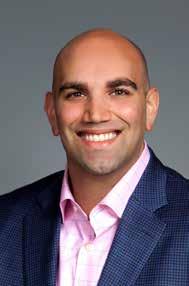


community’s Yom HaZikaron Ceremony, when the community came together to pay respects to fallen soldiers and victims of terror who have given their lives for the State of Israel.

The community’s Yom Ha’atzmaut celebration, to recognize Israel’s 75th anniversary of independence, took place on April 26 at Shalom Park. The unreliable weather and rain didn’t stop attendees from enjoying dancing to live music, good, authentic Israeli food, and fun. Koren and Halel participated by leading the audience in singing “Hatikvah,” Israel’s national anthem.
Beyond the formal events and organized visits, the soldiers connected with people on an individual basis. “They were able to interact and talk to people, sharing their experience protecting the Jewish homeland,” said Tair. “Their visit was an opportunity to humanize the concept of the Israeli military. At the Federation, we continue to come up with new ways to connect our community to Israel, as we believe Israel should be an integral part of everyone’s Jewish identity.”
“They enjoyed their time here,” said Noah. “It was wonderful to see the common Jewish bond between two people from 7,000 miles away and the Charlotte community, which gave them a warm welcome everywhere they went.”
After having the opportunity to hear Irving Bienstock’s Holocaust survivor story for the Levine JCC Butterfly Project, Halel was so moved that she presented him with a pin from her army unit — a set of eagle wings with an inscription in Hebrew on the back that means “only victory.” Irving told Halel, “I was a child in the Holocaust and we were defenseless for 2,000 years. To receive such a gift from a soldier in the Israeli army is the greatest gift.”
Mariashi Groner, head of CJDS, said Israeli soldiers are always welcome and this visit was no exception. Halel and Koren spoke to the third through sixth grade classes and shared why they serve and how important the land and country are to them. Mariashi said it makes the connection to Israel more tangible when people like Halel and Koren spend time with students. “It’s better than having a celebrity. You could tell how honored the students were and that they understood important people were visiting with them.”
Halel shared with the students how she had to stay in a sleeping bag in the forest for two days to find the enemy, describing how much patience and resilience were needed. One student asked, “Did you ever see the enemy?” She smiled, “Oh yeah,” she said.
Mariashi pointed out to the children the soldiers were not only brave in their military service, but also in coming here and speaking to large audiences in English, which isn’t their first language. “We can learn from their bravery and understand we just have to do our best,” she said. “These soldiers were mod-
Buying, Selling
eling desired behavior for our children.”
Back in Israel, and once again on duty, Halel shared her impressions of her Charlotte visit in a social media post (translated from Hebrew): “Still trying to digest my experiences from the Memorial Day and Independence Day that occurred last week, among the more amazing experiences I had in my military service…Grateful for the opportunity to meet many diverse people in such a short time, to participate with them in ceremonies, to hear stories of Holocaust survivors, from people who lost loved ones, who love and appreciate the state of Israel.”

Each morning, the children at CJDS say a prayer for Israeli soldiers. Through visits from soldiers like Halel and Koren, the prayer is not theoretical, but for the real men and women who protect Israel day in and day out.

The Charlotte Jewish News - June/July 2023 - Page 3 704.247.3033 kgreenspon@windinsgroup.com Since 1974, we have assisted community families and businesses with: • Group Benefits • Life, Disability & Long-Term Care Insurance • Business Planning & Executive Benefits • Medicare Plans & Annuities As part of the Windermere Insurance Group, Greenspon & Associates can now also help with: • Homeowner's, Auto, & Umbrella Coverage • Commercial Business Insurance & Builder's Risk • Professional Liability Keith Greenspon Advisor
is an award-
to
Andrew
winning agent ready
assist in your real estate journey. Named in the Top 1% of All Real Estate Agents in 2021 by Real Trends. In addition, Andrew is an involved member and leader in our Charlotte Jewish community.
or
Andrew Rosen team of real estate agents affiliated with Compass, a licensed real estate broker under the name "Compass South Carolina, LLC" in South Carolina and under the name "Compass" in North Carolina and abides by Equal Housing Opportunity laws. Andrew Rosen andrew.rosen@compass.com M: 704.604.4756 | O: 704.234.7880 (Continued from
page)
Relocating?
front
Jewish
Irving Bienstock and Halel Mintzer
Koren Yohanan shakes hands with Charlotte Jewish Day School students.
Halel and Koren lead “Hatikvah” at community Yom Ha’atzmaut celebration.
Halel and youth celebrate Israel’s 75th.
On April 26th, more than 400 people joined our community’s Yom Ha’atzmaut celebration. Attendees enjoyed an authentic Israeli barbeque prepared by famous local chefs, Haim Aizenberg and Elan Bar-el. Lawn games, music by AvevA and community were enjoyed by all.

The Charlotte Jewish News - June/July 2023 - Page 4
Sue’s Bookshelf
day. Mary Jane, a 14-year-old under the influence of her country club set, strait-laced Presbyterian parents, goes to work as a nanny for a Jewish psychiatrist and his bohemian wife who are hosting a recovering rock star drug addict and his mega movie star wife for the summer. Needless to say, Mary Jane’s sheltered life is no more, but hers is not the only one that changes throughout the course of this very entertaining book.
By Sue Littauer
Is the summertime for reading the books you didn’t have time for during your busy year, or is it the time for light reading — AKA beach reads? Whether you’re looking for fiction, nonfiction, or historical fiction, I have some recommendations for you.
I recently read two nonfiction books: “Koshersoul: The Faith and Food Journey of an African American Jew” by Michael W. Twitty and “The Last Kings of Shanghai: The Rival Jewish Dynasties That Helped Create Modern China” by Jonathan Kaufman. “Koshersoul” was the winner of the Jewish Book Council’s 2022 Jewish Book of the Year Award. Michael Twitty is a renowned culinary historian and educator grounded in his experiences as a Black, gay, Jewish person who loves food and believes in its power. I expected a book full of recipes and anecdotes, but quickly found it to be a serious read, often difficult at times, which addresses the author’s premise that we are all mishpocha in the intersection of Black and Jewish culture.
Georgia Hunter, author of “We Were the Lucky Ones,” describes “The Last Kings of Shanghai” by saying: “With ex-

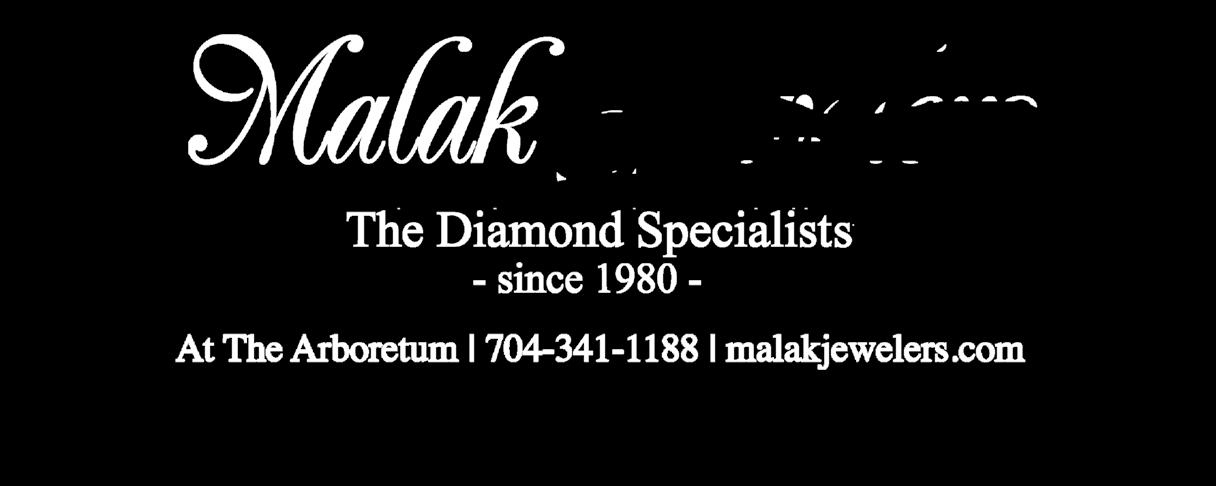

acting research and masterful prose, Kaufman excavates the tremendous influence of two Jewish families both with roots in Baghdad, on China’s layered and complex modern history. An astonishing read, on every level.’’ Although I’ve read a few historical fiction novels about the Jews in China and Shanghai, reading Kaufman’s detailed book about the Sassoon and Kadoorie families was interesting and in formative.
I always look forward to new books by Elinor Lipman, so if you’re into contemporary fiction and looking for something differ ent, try “Ms. Demeanor.” “Who knew house arrest could be sexy and fun? Not me, at least not until I read “Ms. Demeanor.” Written with Elinor Lipman’s signature wit and charm, this breezy, en grossing novel tells the story of two people who make the most of their shared confinement.” —

Tom Perrotta, New York Times bestselling author of “Tracy Flick Can’t Win.”
I also highly recommend “Mary Jane” by Jessica Anya Blau. I literally could not put this book down and read it in one
Two new excellent books of historical fiction are “Once We Were Home” by Jennifer Rosner and “Code Name Sapphire” by Pam Jenoff. “Beautifully evocative and tender, filled with both luminosity and anguish, “Once We Were Home” reveals a little-known history. Based on the true stories of children stolen during wartime, this heart-wrenching novel raises questions of complicity and responsibility, belonging and
drawn characters and their circumstances will stay in your heart for years to come.
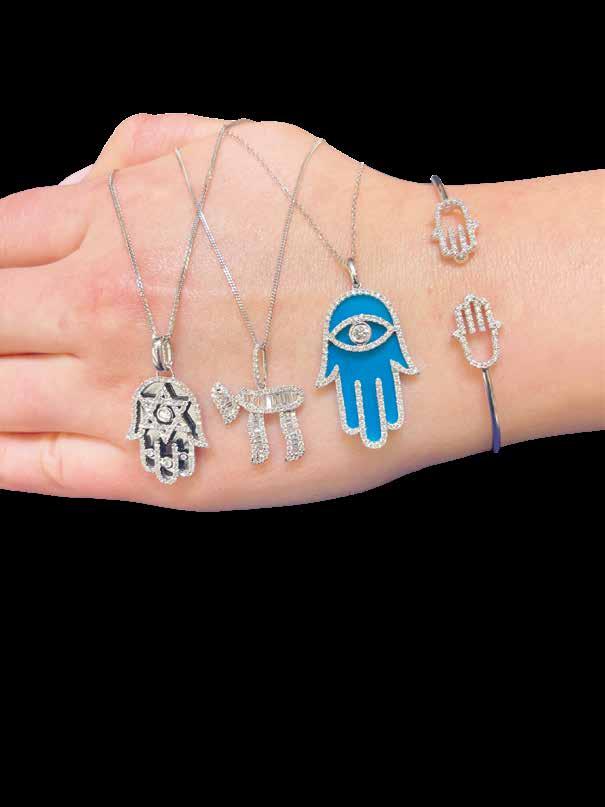
“Code Name Sapphire” set during World War II is the story of a Belgian brother/sister team

airman to safety. Hannah, a Jew fleeing Germany, ends up trapped in Belgium living with her estranged cousin Lily and her family. The four lives intersect during this fast-paced, heart-stopping novel which, in my opinion, is Jenoff’s best yet. Hopefully, you’ll pack one or more of these books in your bag as you head into summer vacation! All six books can be found at the Levine-Sklut Judaic Library at the Center of Jewish Education at Shalom Park.
The next CJE Book Club meeting is Wednesday, June 14 at 10:30 a.m. at Shalom Park. The book we will be discussing is “He Gets That from Me” by Jacqueline Friedland. For more information, please contact sueb. littauer@jewishcharlotte.org.

(Editor’s Note: See page 31 for Charlotte Rouchouze’s review of “Koshersoul” in her Around the Table column.)


The Charlotte Jewish News - June/July 2023 - Page 5
Diamonds, Bridal, Custom Design Fine & Estate Jewelry, Buy, Sell, Repair, & Appraise Diamonds Imported from Israel
Jewish Federation of Greater Charlotte
Miss Debby’s
Frank: The Diary of a Young Girl” has been read all around the world and has been translated into more than 70 languages. Indeed, it is one of the most-read books of all time.
Children’s Books
By Debby Block, JFGC Program Coordinator and Douglas Greene, JFGC Government Relations and Public Affairs Associate

The Jewish Federation of Greater Charlotte is committed to putting an end to antisemitism and anti-Israel hatred by educating, strengthening, and uniting the local community through the Outshine Hate initiative. Through the initiative, the Jewish Community Relations Council (JCRC) works with local public and private schools to provide resources around antisemitism and Holocaust education. As a Jewish community, we recognize the importance of acting now and standing up to hatred, and we want to make sure that moving forward no one has to face these issues alone.
June 12 is the birthdate of the incomparable Anne Frank and as we recognize the 94th anniversary of her birth, we must be grateful for Anne’s portrait of a horrific time in history through her youthful eyes.

Anne Frank received a diary for her 13th birthday. From the ages of 13 to 15, she filled its pages with her experiences, thoughts, and dreams. “Anne
Why is Anne’s story important? “Those who do not learn history are doomed to repeat it” (G. Santayana). It is for this very reason that many parents and educators know how important it is to teach about the Holocaust, even though it is such a dark and harrowing period in modern history.

Parents frequently ask us what books to share with their child about the Holocaust and students often request books about Anne Frank. With this in mind, Douglas Greene, currently the government relations and public affairs associate for the Jewish Federation of Greater Charlotte and a former Holocaust educator, and I are sharing some of the best, age-appropriate resources for children on the life of Anne Frank.

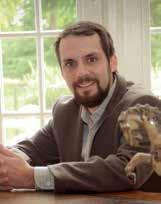
The original book “Anne Frank: The Diary of a Young Girl,” written by Anne Frank (and edited by her father, Otto Frank), deals with antisemitism and the horrors of World War II. Anne’s voice is genuine and truly reflects the feelings of a young teen dealing with isolation and deprivation as well as budding romance and dreams. The diary undoubtedly deals with serious content matter and, of course, is not always sanguine. Nonetheless, Anne’s voice is often funny, spirited and inspirational. For example, Anne writes “We all live with the objective of being happy; our lives are all different and yet the same.” This book is well worth reading for every tween/
teen at some point We would recommend “Anne Frank: The Diary of a Young Girl” for readers at least 12 years old, since some language and content material is complex and requires a mature outlook. Here are other recommended books and resources for a variety of ages about Anne Frank: It is definitely challenging to find age-appropriate books about Anne Frank for early elementary school-aged children. Nonetheless, we recommend three books for children 5-8 years old. “The Tree in the Courtyard: Looking through Anne Frank’s Window” by Jeff Gottesfeld tells a gentle version of Anne’s story from the point of view of a tree. The chestnut tree that stood outside of the secret annex where the Frank family hid during the German occupation of Amsterdam. The tree watches Anne for two years as she plays, laughs, and writes in her diary and the tree watches when the family is taken away. The tree waits and waits for the girl to return, but unfortunately, only the father returns. Appropriately for younger readers, this book does not directly deal with concentration camps or Anne’s death.
Brad Meltzer has written a wonderful series of books for children about ordinary people who change the world. Meltzer’s book “I am Anne Frank” is the perfect blend of facts, picture book and graphic novel. True to Meltzer’s popular biography series, this book inspires kids to be positive role models like Anne Frank. This is a positive and uplifting book that ends with the words “I am Anne Frank, and I believe that people are truly good at heart.” We give this book a 10 out of 10!
Finally, we recommend “Little People, BIG DREAMS: Anne Frank” by Maria Isabel Sanchez Vegara. The verbiage of this picture book is simple and to the point, while the black-and-white illustrations by Sveta Dorosheva provide the perfect accompaniment. The book tells the facts of Anne Frank’s life in a straightforward manner and, as such, is not frightening. While the book does mention that the family is arrested and pushed onto a train, it does not directly deal with Anne’s death. Vegara’s basic, yet beautiful version of Anne Frank’s life could even be shared with an older four-year-old child due to its simplicity.
For slightly older children (6-9 years old), we recommend the gentle, yet honest book “Miep and the Most Famous Diary: The Woman Who Rescued Anne Frank’s Diary” by Meeg Pincus. Miep Gies sheltered and helped provide food for the Frank family while they were in hiding from the Nazis. This picture book retells the story of Anne’s capture from Miep’s point of view and describes how Miep found Anne’s diary and hid it from the Nazis. Without Miep’s courage
and compassion, we would never know about Anne Frank’s story today. The author’s notes and a timeline provide helpful insights and background information.
“Martin & Anne: The Kindred Spirits of Dr. Martin Luther King, Jr. and Anne Frank” by Nancy Churnin and artfully illustrated by Yevgenia Nayberg
This children’s picture book perfectly juxtaposes the lives of two incredible human beings through the year of their birth (both were born in 1929) and by sharing their stories of finding hope even in the darkest circumstances. Although the book states that Anne Frank died and that MLK was shot and killed, readers are left with the positive message that their words of kindness will never die. We highly recommend this inspirational book for children 7-11 years old.
“Little Guides to Great Lives: Anne Frank” by Isabel Thomas provides a great introduction to a hard topic. The book includes a timeline, a glossary, and an index. The engaging illustrations provided by Paola Escobar animate the story in a manner that makes the facts easy to digest, including portraits of all the family members, a diagram of the Secret Annex, and illustrations of many of Anne’s activities in hiding.
“Little Guides to Great Lives: Anne Frank” does state briefly that Anne and her sister Margot caught typhus and died. We recommend this book for children 7-11 years old.
Finally for children 8-12, we recommend “Who Was Anne Frank?” by Ann Abramson and “Great Lives in Graphics: Anne Frank” published by Button Books. The latter book presents the life of Anne Frank in a fresh, new way, which may appeal to kids who do not enjoy typical chapter books. Through the use of colorful infographics and pithy blocks of text, “Great Lives in Graphics: Anne Frank” may capture any child’s interest.
“Who Was Anne Frank?” is part of the kid-friendly and very popular “Who Was” series. This book features all the pertinent information about Anne Frank in an easy-to-read chapter book format. We highly recommend this book as an introduction to the life of Anne Frank.
Another valuable resource for students in middle and high school is the Twitter campaign launched in partnership between the United Nations and the Anne Frank Center. This campaign was launched in 2010; and offers an interactive way that students are able to better synthesize and absorb the complexities of studying The Diary of Anne Frank.
The Charlotte Jewish News - June/July 2023 - Page 6
Jewish Federation of Greater Charlotte
In Recognition of Anne Frank’s 94th Birthday Premier Concierge Property Management www.roskindhomes.com Hunter Roskind Realtor®/Broker If you or anyone you know have a property in need of a property manager, please call me at: 980.288.5616 hroskind@gmail.com Richard Roskind Realtor®/Broker LICENSED IN NC & SC 704.905.6175 rcroskind@aol.com Brokerage Residential & Commercial (Continued on page 7)
Best-Loved
Anne Frank
Hanoch Piven: Artist-inResidence Creates Art From Junk
To conclude the Israel@75 events in Charlotte, Jewish Federation of Greater Charlotte hosted acclaimed Israeli artist Hanoch Piven. Hanoch, in his words, creates art from junk. His work strives to create meaning and emotion from everyday objects that we might otherwise ignore. Hanoch conducted workshops for the Charlotte Jewish Preschool, Temple Beth El, the Levine Jewish Community Center, Temple Kol Tikvah, the Jewish Federation, and the Charlotte Jewish Day School. At the conclusion of each workshop, he posted all the portraits online for the Charlotte community to keep.
Miss Debby
(Continued from page 6)
Students are invited to send “tweets” to Anne as if she were able to communicate with them; this exercise is meant to help young people make a meaningful connection to the Holocaust through social media. Examples include “What messages of support would you have sent Anne?” or “What would you have told Anne that you have learned from her life and expe-
rience?” This simple yet meaningful interaction between student and text allows for deeper understanding and connection to the true spirit of the novel, a truly inspiring assignment.

New PJ ConnectorLibrary for Lake Norman Area
 By Debby Block
By Debby Block
One of the most essential goals of the Jewish Federation of Greater Charlotte (JFGC) is to create opportunities for Jewish families to connect with each other and to build and strengthen our Jewish community. To this end, the JFGC is pleased to announce the renewed implementation of the PJ Library program in the Lake Norman area —the PJ Library Connector program.
PJ Library Connectors are currently active in more than 20 communities across North America. Their job is to create small, neighborhood-based gatherings and connect families raising Jewish children to each other and to the Jewish community.


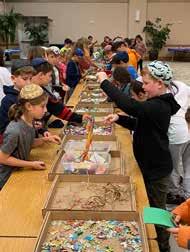

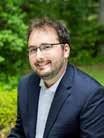
We are proud to announce that Alana Rowley is the new parent connector for the Lake Norman area! With a background in event planning, Alana is the perfect fit as the Jewish Federation of Greater Charlotte’s PJ Library connector for Lake Norman.

Alana is originally from South Florida, but has lived in North Carolina for the past seven years. She lives in Mooresville with her husband, Trent, and two children, Remington, who is four-and-ahalf years old, and Dublinn who is two years old.
Alana writes, “I want to be a PJ Library connector because I love meeting new people and making connections. My goal is to share events, to meet other Jewish families, and to build a warm, vibrant community for our children. As my family is interfaith, it is very important to me to be welcoming to everyone in my life. I am eager to be the face that says it is fine to come to events no matter how you identify with Judaism. Your family matters and I cannot wait to get to know your family!”
A. Lewis
The Charlotte Jewish News - June/July 2023 - Page 7 Paul Mattos Mortgage Banker NMLS #2339069, Licensed in NC, SC 980-221-4959 PaulMattos@AtlanticBay.com www.CarolinaHomeFinancing.com PaulMattos.com Your Trusted Local Lender Get the Care You Deserve from
Daniel
Family Law Attorney DRC - Certified Family Financial Mediator Collaborative Divorce Professional Assisting families in resolving family law disputes since 2005 • Divorce • Child Custody & Support • Alimony • Distribution of Assets & Debts • Pre-marital Agreements Named to The Best Lawyers in America® for Family Law (2019 – 2023) Proud Member of the Charlotte Jewish Community Since 2010 Tin Fulton Walker & Owen, PLLC Tel (704) 338-1220 | dlewis@tinfulton.com | www.tinfulton.com
Jewish Federation of Greater Charlotte
Alana Rowley
CJDS students choose supplies from the “buffet.”
Hanoch Piven
Jewish Federation of Greater Charlotte employees, friends, and family show off their portraits with Hanoch Piven
Yom HaShoah Event Brings Community Together
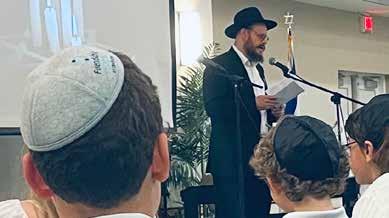
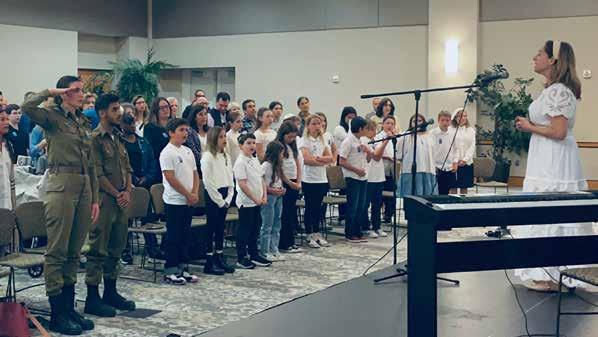
 By Mary Eshet
By Mary Eshet
Each year the community comes together to observe Yom HaShoah, alternating between Temple Beth El and Temple Israel as hosts. This year, Shira Lissek, cantor at Temple Israel, had a vision to make the event especially meaningful — by including music played by the Charlotte Symphony.
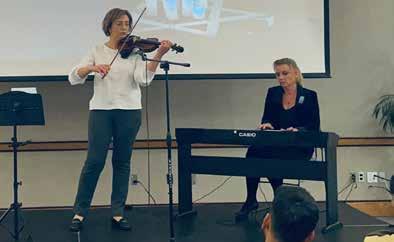

Making this happen meant pulling in multiple sponsors and supporters. It’s not easy to plan and coordinate an event with so many involved, but the spirit of collaboration was strong throughout. “There were 5,000 twists and turns as we worked to balance tradition and relevancy,” said Lissek. “It worked because everyone on the committee cared so much.”
Judy La Pietra, assistant director of the Stan Greenspon Holocaust and Social Justice Education Center at Queens University agrees. “We met over several months,” she said. “Everybody had a job; everyone listened. I felt humbled to be part of this event, and proud to represent the Greenspon Center, as it is core to our mission.”
Cantor Mary Thomas of Temple Beth El has been involved in planning the ceremony for seven years. “The experience of collaborating with the other agencies is always one of the greatest joys and privileges of my year,” she said.
The idea to invite the symphony originated with a desire to use the power of music to express the unexplainable — that which is beyond words. “My hope was that we could use music to help build bridges,” said Lissek.
The program was presented in
two parts, which flowed together seamlessly. Cantor Thomas greeted the audience with her beautiful voice in an opening melody. Temple Israel’s Rabbi Wolk welcomed the audience of nearly 500, noting that remembrance is a mitzvah and sharing his hope that remembering evil will lead to increasing the human spirit.
Sheryl Gerard of Jewish Family Services led the candle lighting ceremony. The seven candles — six for the six million Jews who perished in the Holocaust and one for all others — were lit by first- and second-generation survivors who shared survivors’ responses to two prompts: “On this Yom HaShoah I remember ...” and “On this Yom HaShoah my hope is...”
The reflections on those lost and those who survived the atrocities of the Holocaust were painful and heartbreaking. Yet, there was a common theme in the words spoken about hope — a striking lack of vengeance and a
resounding hope that the world never forgets and “through sharing our stories, others will not let hate divide us from our humanity.” They expressed the hope that everyone will speak out against “any form of racism or bigotry so everyone can live in peace,” and of being “upstanders, not bystanders,” as we cannot remain
Community Observes Yom HaZikaron
soldiers and victims of terror in observance of Yom HaZikaron. Clergy from across the community, two Israeli soldiers and the Charlotte
silent while humans suffer.
The commemoration part of the program also included a memorial prayer sung by Cantor Lissek and Kaddish led by Rabbi Judy Schindler. As the 18 symphony musicians made their way to the bimah for the concert, our community’s Holocaust survivors were honored through slides shown on the screen.
David Fisk, CEO of the Charlotte Symphony welcomed the invitation for the musicians to take part in the event. “We very much appreciated this opportunity to serve the community. We want to be available for significant, meaningful events.” The symphony does not normally take part in religious events, but the way the program was structured allowed an unobtrusive separation between the religious observance and the concert.
The symphony performed nine pieces, including several featuring Cantor Lissek’s and Cantor Thomas’s amazing voic-
es. The thoughtful introductions delivered by conductor Christopher James Lees made the music even more meaningful. He said the symphony was honored to perform pieces that are not heard as often as they should be, and shared the Holocaust-related history of the composers.
Cantor Thomas said she chose pieces that could “evoke emotions or ideas that could connect to the experience of the Shoah.” For example, Ravel takes the familiar High Holiday Kaddish and transforms it into something “haunting and ethereal, as if a whisper of the memory of the Jewish past.”
The vision for the evening was ambitious, and could not have been realized without the support and collaboration of many agencies and individuals. In addition to the two temples, the Jewish Federation of Greater Charlotte, Jewish Family Services, the Leon Levine Foundation, the Butterfly Project, the Stan Greenspon Holocaust and Social Justice Education Center at Queens University, the N.C. Council on the Holocaust, Richard Osborne, Milton and Arlene Berkman, Stan Greenspon, Leon (OBM) & Sandra Levine, and of course the Charlotte Symphony contributed time and funds to make the event a reality.
David Fisk remembers the moment when Associate Concert Master Joseph Meyer stood to play the theme from Schindler’s List. “A shaft of light came in and shone on him,” said Fisk. “It was a dramatic and powerful moment that seemed a perfect metaphor for this event.”
The Charlotte Jewish News - June/July 2023 - Page 8
Our community came together on April 17 to remember the fallen
Jewish Day School Choir participated in this moving event as we commemorated the sacrifices so many have made.
Michael Reichman, vice president of artistic operations and general manager, Shayne Doty, vice president for development, Cantor Mary Thomas, cantor of Temple Beth El, Cantor Shira Lissek, cantor of Temple Israel, Christopher James Lees, resident conductor of Charlotte Symphony and principal conductor of Charlotte Symphony Youth Orchestra, David Fisk, president and CEO of Charlotte Symphony
Cantor Mary Thomas of Temple Beth El performs with Charlotte Symphony Orchestra at community Yom HaShoah observance.
Inna Amromin and Marina Goman perform “When the Heart Cries.”
Rabbi Weiss leads Kaddish.
Cantor Shira Lissek leads “Hatikvah”
Deep South Pilgrimage Inspirational for Charlotte Black/Jewish Alliance

 By Mary Eshet
By Mary Eshet
In April, vandalism at Davidson College involved a blackboard with slurs, swastikas, a drawing of Hitler in chalk and a handwritten message about killing “Jews and n******.” This offensive graffiti illustrates the legacy of hate and oppression Blacks and Jews share. The Charlotte Black/Jewish Alliance, sponsored by the Stan Greenspon Holocaust and Social Justice Education Center at Queens University and Johnson C. Smith University, seeks to unify Blacks and Jews to combat hate and promote social justice.
As a member of the first cohort of the Alliance, Terrell Hamlet’s hope was for more people to get involved. “We want to be the hope and light to any darkness. I never want to see this end,” he said.
Hamlet’s aspirations are coming to life as he co-chairs the second cohort, 14 young leaders from different professions and backgrounds who began the program in December. The group meets monthly for programs, including sessions led by the faculty: Dr. Melvin Herring and Dr. Cindy Kistenberg, from Johnson C. Smith University and Rabbi Judy Schindler, director of the Stan Greenspon Center.
The first and second cohorts use words like “transformational” and “inflection point” to describe the Deep South Pilgrimage that is part of the program.
Aishaah Reed Foster said the trip was phenomenal. “I never wanted to go to Alabama or Mississippi. I felt a lot of trepidation. But it turned out to be amazing. I was astonished about the history we were able to observe – it’s a different feel when you’re in the South, where it happened.”
Aishaah, who is Black, was a public school teacher of history and the Holocaust before she went to law school. Today she is an attorney with Moore and Van Allen in Charlotte.
Rachael Coe, who is Jewish, is also an attorney with Moore and Van Allen. “To be in the places where history happened, you really feel a buzz in the air; it’s

like an out-of-body experience,” she said.
Hal Levinson, a partner at Moore and Van Allen, is thrilled Rachael and Aishaah are participating in the Alliance. “We take our commitment to the community very seriously, and encourage lawyers to find ways to get involved that are meaningful for them,” he said. “It’s terrific for them, for the community, and also for our firm, because they bring back things they’ve learned and become better lawyers as they represent clients from different backgrounds.”
The group boarded the bus early Thursday, March 16. Over the next four days they would spend hours reflecting, having honest conversations, laughing, crying, and singing. They heard from the co-chair of the Atlanta Black Jewish Coalition, learned about Jewish engagement in the Civil Rights Movement in Birmingham, toured the Birmingham Civil Rights Institute and the 16th Street Baptist Church, visited the Equal Justice Initiative Legacy Museum in Montgomery, walked across the Edmund Pettus Bridge in Selma (the site of the brutal Bloody Sunday beatings of civil rights marchers in 1965), and shared a Friday night Shabbat experience.
Mohammed Jibriel, a Black Muslim and Queens University graduate working on his PhD in public health at University of North Carolina Greensboro, said the number one lesson he took away from the trip and the shared legacy between Blacks and Jews is that “all forms of bigotry are interconnected – we can’t dismantle one form without addressing the others.”
The educational experiences of the trip were topped only by the opportunity to deepen rela tionships among participants. “I came away with incredible new friends in our community I wouldn’t have otherwise crossed paths with. We had the opportu nity to reflect on our experiences and to be vulnerable. At the same time, we had so much fun,” said Rachel.
Mohammed remembers a
highlight of the trip just after they visited the EJI Legacy Museum in Montgomery, which showcases the very difficult history of slavery, lynching and incarceration. “We were speechless and worn out when we left the museum,” he said. As they struggled with their thoughts standing in front of the state capitol, suddenly they were in the midst of the finish line for the Selma to Montgomery race and bike ride. The crowd was festive, laughing and dancing – and the group from Charlotte joined in.
“I felt a moment of guilt,” said Mohammed. “We’d just left the museum of such tragedy, and then we were dancing. But then I saw us – a group of Blacks and Jews dancing there on the same steps where Jefferson Davis was sworn in as President of the Confederacy. The guilt turned to joy and liberation as I understood that WE are the dream Martin
Luther King, Jr. spoke of.”
The last stop was to walk across the Pettus Bridge – and then continue in their efforts to cross more bridges and carry the message of unity to a broader community as they began the journey home.
Stan Greenspon Holocaust and Social Justice Education Center
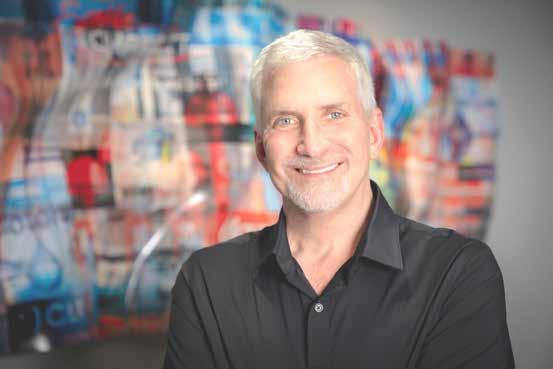
The Charlotte Jewish News - June/July 2023 - Page 9
The second cohort of the Black/Jewish Alliance bond with hope and joy in front of the Alabama State Capitol in Montgomery
The trip included a visit to Birmingham’s 16th Street Baptist Church where on Sunday, September 15, 1963, at 10:22 a.m., a bomb exploded and killed four young girls attending Sunday School.
Retire 38 Y e a r s o f H a r d W o r k & D e d i c a t i o n It's time for Dr Menaker to AFTER Thank you D R S R O D N E Y & B E R M A N N E W P A T I E N T S W E L C O M E W W W S M I L E C H A R L O T T E C O M 7 0 4 - 3 7 7 - 2 5 0 3 June 28, 2023
Meet the Real-Life Rabbi in the Synagogue Scene of “Are You There God? It’s Me, Margaret”
By Jackie Hajdenberg (JTA)

Rabbi Michael Wolk was nervous when he stepped foot onto his synagogue’s bimah in May 2021 — but not because his congregation was returning to in-person prayer after a pandemic pause.
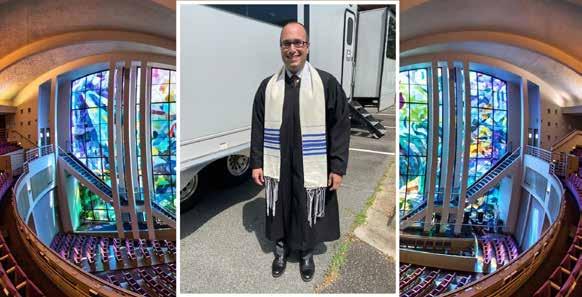
The jitters were because he was about to debut as an actor, in a role for which he hadn’t auditioned: as the rabbi in “Are You There God? It’s Me, Margaret,” which debuted in theaters in May.
Wolk was initially brought on as a consultant for the synagogue scene in the film adaptation of Judy Blume’s classic comingof-age novel, published in 1970 — more than a decade before he was born. He was elevated to onscreen talent when the original actor for the role of Rabbi Kell-
erman left the project.
“They called me that night and said he doesn’t feel that he can do it — would I be willing to play the rabbi?” Wolk told the Jewish Telegraphic Agency. He said yes.
The story centers on a sixth-grader, Margaret (played by Abby Ryder Fortson), who has a Christian mother and Jewish father who have raised her in neither tradition. As part of Margaret’s grappling with her anxiety about growing up, she embarks on an effort to explore religion and visits a synagogue with her grandmother Sylvia, portrayed by Kathy Bates, who is pushing her to identify with Judaism.
In the story, Margaret and her family live in New Jersey, but the filming took place in Charlotte, North Carolina, where Wolk has been the rabbi of Temple Israel, a Conservative synagogue, since 2020. (That year, the synagogue petitioned to have its name removed from a local memorial to Judah Benjamin, the Confederacy’s most prominent Jew.) A Long Island native, he came to the synagogue from a pulpit in Louisville, Kentucky.

The film’s producers asked Wolk to prepare what he referred to as a “sermonette” and to stand in the prayer leader’s traditional spot on the bimah in Temple Israel’s sanctuary, surrounded by stained glass. Some of his congregants sat in the pews as extras, which Wolk recalled as a breakthrough moment for Temple Israel, coming a year into the pandemic.
“It was my first time being in the room, being on the bimah with the people in the congregation,” he said. “Even little things like that moment of people re-
sponding ‘Shabbat shalom’ when I said it to them, there was something very moving about that.”
But the moment was hardly a typical Shabbat service. For one thing, it was a weekday. For another, Wolk was wearing a black robe, commonly worn by Conservative rabbis and cantors in the mid-20th century but not in fashion today. And his sermon was interrupted repeatedly.
“It did not feel like I was leading a service at any given time because they would have me say ‘Shabbat shalom’ 100 times and have the people and the extras in the room respond ‘Shabbat Shalom’ over and over again,” Wolk said.
The synagogue scene, which is just a few minutes long, took 14 hours to film.
Besides the rabbi’s attire, there are a few differences between the American Jewish world of “Are You There God? It’s Me, Margaret” in the 1960s and 1970s
and the one today. The film has a female cantor, which wouldn’t have been the case at the time the movie takes place. While the book and movie don’t specify which movement of Judaism the synagogue Margaret visits belongs to, women weren’t ordained in the Reform movement until 1972 and in the Conservative movement until 1985.
“I did point that out and they were interested in representation,” Wolk said. “And that doesn’t bother me that much, but I know that it’s historically inaccurate.”
There are some other continuity issues with the scene: The actors used the prayer books in Temple Israel’s sanctuary, which were only published in the last decade. While the congregation is well over a century old, its current building wasn’t constructed until 1992. And, Wolk confessed, he is wearing an Apple watch, though it is obscured by his robe.
But also, he said, norms around interfaith families like Margaret’s have changed over the decades. In the United States, Jews who married before 1970 married non-Jews 17% of the time, according to a 2013 population study; now, that number is well over 50%. But contrary to what some feared, many of those interfaith couples are raising their children at least in part with Judaism. Their synagogues have adjusted accordingly.
“At the point when the book was written, there was no expectation that an interfaith family would want to participate in the religious life and Jewish life of a synagogue,” Wolk said. “And we know that’s not true right now. We have any number of interfaith families who are active and involved in Temple Israel.”
The Charlotte Jewish News - June/July 2023 - Page 10
Rabbi Michael Wolk stands in his rabbi-character costume outside the production trailers for "Are You There God? It's Me, Margaret," which filmed in his synagogue, Temple Israel of Charlotte, North Carolina. (Courtesy Michael Wolk, Louis Davidson)
“Mishpacha Memories” Brings History to Life at Hebrew Cemetery
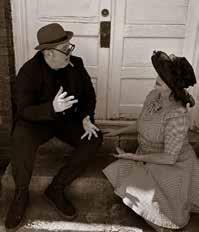 By Brian Yesowitch, Hebrew Cemetery Association Historical Chair
By Brian Yesowitch, Hebrew Cemetery Association Historical Chair




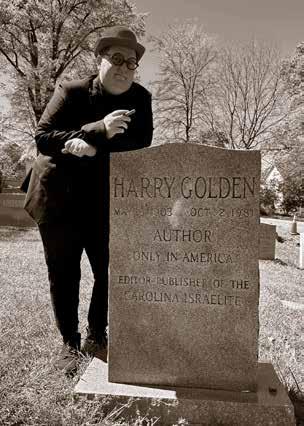



Most of us have experienced excitement and admiration when we hear about someone in sports, entertainment, or another field who has done something noteworthy and newsworthy. For many of us, that excitement grows, and our hearts swell when we learn they’re Jewish!
It’s such a common feeling for many Jews that even Adam Sandler wrote a song about it — “The Hanukkah Song.” In it, he lists famous Jews like Kirk Douglas, Leonard Nimoy, and Goldie Hawn. By the way, Adam is also our nation’s most recent Mark Twain Prize for American Humor recipient and yes, he’s Jewish!
It is in this spirit that our Hebrew Cemetery Association and our Cultural Arts Committee at the Levine Jewish Community
and even as far back as 1870, when our cemetery was founded and there were barely 15 Jewish families in Mecklenburg County. You’ll get a chance to see actors in period costumes (you are also welcome to dress comfortably in the era of your choice) and hear their stories of what life was like in those bygone eras of Jewish Charlotte.
Additionally, our friends at McEwen Funeral Service Pineville Chapel will dress as 19th century undertakers and bring their horse-drawn hearse. We know that was the minhag (tradition) of our cemetery before automobiles were popular because we have mentions in the Charlotte Daily Observer. For example in June of 1876 when the funeral of Jacob Rintels was such an important event in Charlotte that businesses were closed for half a day and people followed the horse-drawn hearse
on the third floor of that address that is now the home of the Bank of America Corporate Center — the tallest building in Charlotte. There will be a reenactment of the Rintels Family — Jacob, his
a founding family of Temple Emanuel in Gastonia and held services in their home before a permanent building could be acquired for that congregation. We also look forward to hearing the stories of fruit and vegetable magnate Moses Richter, whose Spartanburg, South Carolina property was co-owned with movie and television personality Groucho Marx. Groucho was interviewed by the Observer in Moses’ home in the early 1960s. Attendees to the cemetery on June 11 will also get a chance to hear Gladys Lavitan recite “Outward Bound” the Sutton Vane poem that bookended her 80-year Charlotte stage and film career. Leaders in our community in business, literature, broadcasting, and other professions will be portrayed in period costumes at the event. All are welcome.
This event is being co-pro -
and the Levine JCC. Michelle says, “The collaboration between the LJCC and the Hebrew Cemetery on Mishpacha Memories is a powerful testament to the community of Jewish life where the living and departed are bound together in memories and hope. A historical tour highlighting our Jewish history helps us understand the journey that brought us where we are today and inspires us to appreciate our heritage and the lives of our ancestors.”
Please sign up to attend the event.RSVP online at charlottejcc.org. If you have further questions, you may email Sandra, director@hebrewcemetery.org or Michelle, michelle.rusgo@ charlottejcc.org
To learn more about the Hebrew Cemetery, purchasing funeral plots, or membership and donation opportunities, please contact our Director, Sandra Goldman at (704) 576-1859 or

Mishpacha Memories Join us at the Hebrew Cemetery and enjoy actors’ portrayals of some of our most beloved Jewish Charlotteans. Sunday, June 11 10am – 1pm In collaboration with the LJCC Department of Art & Culture FREE EVENT • OPEN TO THE PUBLIC RSVP and Sign up for one of two tours (10am & 12pm) at www.charlottejcc.org Q? michelle.rusgo@charlottejcc.org or director@hebrewcemetery.org
Douglas Greene portrays Harry Golden as part of Mishpacha Memories.
The Charlotte Jewish News - June/July 2023 - Page 11
McEwen Funeral Service Pineville Chapel
FCJC Community Community Legacy Celebration and Annual Meeting
The Foundation for the Charlotte Jewish Community (FCJC) held its Community Legacy Celebration and annual meeting on Sunday, April 23. The event, held at Foundation For The Carolinas, honored individuals and families for their legacy gift commitments in support of the future of Charlotte’s Jewish community and recognized legacy donors who passed away over the past year. FCJC board chair, Phil Warshauer, thanked the legacy donors, FCJC fund holders, and Jewish professionals for their commitment to building and preserving the community. He reported FCJC assets under management of $179.8 million for 2022, down from a record high of $211.3 million the previous year. Over $9.1 million in new gifts were received by FCJC-managed funds and $10.4 million in grant distributions were made to support Jewish and secular nonprofits. FCJC-managed funds have distributed over $52 million in grants over the past five years. The growth of FCJC’s philanthropic planning work has resulted in over $60 million of after-lifetime commitments to FCJC with over $40 million designated to support local Jewish organizations.
“Each of these gifts has a plan,” said Warshauer. “When we receive these gifts, FCJC will follow these plans and allocate the assets to support our clients’ favorite charities. Some of these plans include assisting their children and grandchildren to identify their favorite charities and establish their own legacy of charitable giving.”
Outgoing FCJC board chair, Stephen Philipson, reflected on the past two years and thanked the FCJC Board. “We have emerged from the pandemic and are back to business,” said Philipson. “We are once again in board rooms and committee meetings assisting our Jewish partner agencies and meeting with fundholders about their current giving and philanthropic planning. We are re-launching our ‘Create Your Jewish Legacy’ initiative. Our strategic planning committee and FCJC board have finalized our strategic plan with a focus on ‘Inspiring Philanthropy’ and ‘Building Community.’ We will do this in collaboration with our community partner organizations. I am excited for Ira’s tenure as chair.; I could not have asked for a better partner, and I look forward to FCJC’s chapter growth under his leadership.”
In accepting the role of FCJC board chair, Ira Slomka shared how he and his wife Stacey established a donor-advised fund
and created their legacy gifts.
“Almost everyone in the room has a similar story,” said Slomka. “You are here tonight because you also understand the importance of FCJC’s work. I am excited about the next several years and look forward to further developing our relationships with current and new donors and our partner agencies.”
The business part of the event included the nomination and approval of new board member, Brian Kahn, and current board members Elise Kosofsky and Ira Slomka. Each will serve a threeyear term. Slomka thanked Mike

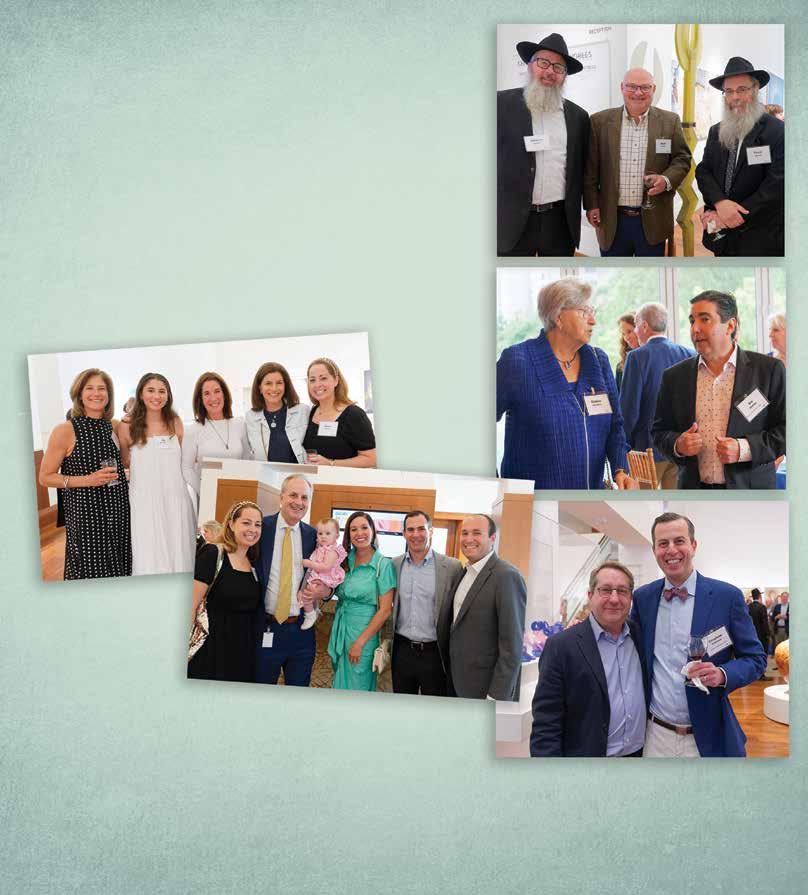
Scharf and Emily Zimmern, who have served their terms for their commitment and service to FCJC. The FCJC Executive Committee will be Ira Slomka, chair; Jon Massachi, vice chair; Holly Levinson, secretary; David Cantor, treasurer; and Stephen Philipson, immediate past chair.
2023 Community Legacy Celebration and FCJC Annual Meeting

Held on April 23 at Foundation For The Carolinas and attended by FCJC fund holders, legacy donors, and community stakeholders

The Charlotte Jewish News - June/July 2023 - Page 12
To learn more about FCJC or legacy giving, please contact Abby Kleber (704) 973-4554 or akleber@charlottejewishfoundation.org. Scan to view the
2022 FCJC annual report
Local Jewish Leaders Attend Life and Legacy Leadership Conference

The Foundation for the Charlotte Jewish Community (FCJC) sponsored five Jewish community professionals to attend the Harold Grinspoon Foundation’s 2023 Life & Legacy Leadership Conference in Springfield, Massachusetts in early May. Joining FCJC’s Phil Warshauer and Abby Kleber were Annie Keith and Melanie Hersch (Levine Jewish Community Center), Jonathan Friedman (Temple Beth El), Sam Bernstein (Jewish Federation of Greater Charlotte) and Dave Press (Moishe House). The Charlotte delegation participated in workshops, networking opportunities, and collaborative learning with key stakeholders from more than 70 communities across North America, with a focus on building successful and sustainable legacy programs.
“Legacy giving is the key to building endowments to support our community’s Jewish future,” said Phil Warshauer, FCJC executive director. “Their attendance at this conference showed their commitment to legacy giving and to reinvigorating our communi-
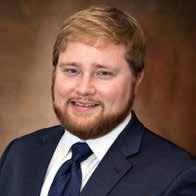

ty’s successful Create Your Jewish Legacy initiative, in support of their own organizations and the entire community.”
In addition to attending workshops and strengthening relationships between organizations, the Charlotte attendees had the opportunity to meet privately with Life & Legacy and PJ Library
founder, Harold Grinspoon and his daughter-in-law, Winnie Sandler Grinspoon, president of the Harold Grinspoon Foundation.
The following individuals/families are in the Book of Life Society and have granted us permission to share with you that Jewish Family Services has been included as a beneficiary of their legacy gift.

Anonymous* (3)
Susan and Benjamin Aizenman
Gail and John Baron
Michael and Meredith Baumstein
Sanford and Lois Benjamin
Raymond Monty Bennett
Nancy and Sam Bernstein
Susan P. Bessey
Lillian (OBM) and Irving Bienstock
Peter Martin Blair
Philip Blumenthal
David and Bonnie Bornstein
Marian (OBM) and Walter Brawer
Richard (OBM) and Suly Chenkin
Jennifer and Jonathan Collman
Andrea and George Cronson
Michael and Beth Cupp
Ellen (OBM) and Dan (OBM) Dubin
Paul and Lynn Edelstein
Steven and Ellen Block Englehardt
David and Aleen Epstein
Melvin W. and Caren N. Frank
Alan (OBM) and Ruth Goldberg
Mark and Linda Goldsmith
Matthew Luftglass and Meg D. Goldstein
Milton and Arlene Goldstein
Shelton and Ellen Goldstein
Jennifer Cohen Golynsky and Leon Golynsky
Brett H Goodman
Keith E. Greenspon
Stanley Greenspon
Joel Horwich
Andrew and Christy Horwitz
Jonathan M. Howard
David Jacobson
Florence Kaufman Jaffa
Robert and Nancy Kipnis
Lorrie and Barry Klemons and Family
Barry Bobrow and Karen Knoble
Elise and Jaime Kosofsky
Eric and Susan Lerner
Gary and Donna Lerner
Harry and Gloria Lerner
Barbara and Jerry Levin
Ross C. Levin
Leon Levine Foundation
Howard Levine and Julie Lerner Levine
Louis A. Sinkoe and H. Kevin Levine
Holly and Hal Levinson
Lisa Strause Levinson
Andrew and Gwendolyn Lindner
Adina and Josh Loewensteiner
Annie and Harrison Lord
Isaac (OBM) and Sonia (OBM) Luski
Laura Milgrim
Risa and David Miller
Staci and Darren Mond
Margaret Musa
Richard J. Osborne
Marcelle and Allan Oxman
Wendy and Lee Pake
Harriet and Mark Perlin
Wendy and Adam Petricoff
Deborah and Ed (OBM) Pizer
Larry and Dale Polsky
William and Debra Porter
Baila (OBM) and John (OBM) Pransky
Susan and Bernie Sandler
Michael Scharf
Marty and Elaine Schefflin
Larry Schwartz
Morey and Lynne Sheffer
Milton and Karen Silver
Gary and Maxine (OBM)
Silverstein
Jonathan and Stephanie Simon
Anne and Mike Sinsheimer
Lori and Eric Sklut
Steve and Emily Snyder
Harry and Laurie Sparks
Philip and Lauren Stark
Stephanie and Steven Starr
Norman Steinberger (OBM)
Joseph (OBM) and Renee Steiner
Ken and Marcia Stern
Cheri and Marc Titlebaum
Natalie and Mike (OBM) Tunney
Jeffrey and Karen Turk
Harold (OBM) and Cynthia Turtletaub
Robert and Ellie Valenstein
Judie and Michael Van Glish
Janice and Ronald Weiner
Liz Wahls
Robert (OBM) and Anne Yudell
*Donors who wish to remain anonymous OBM - Of Blessed Memory
To learn how you can create your own Jewish legacy, contact Phil Warshauer (704) 973-4544 or Abby Kleber (704) 973-4554.
The Charlotte Jewish News - June/July 2023 - Page 13
LEGACY DONORS 704.973.4544 • charlottejewishfoundation.org
Charlotte stakeholders meeting with Harold Grinspoon and Winnie Sandler Grinspoon, L to R: Jonathan Friedman (Temple Beth El), Abby Kleber (FCJC), Annie Keith (Levine JCC), Harold Grinspoon, Sam Bernstein (Jewish Federation of Greater Charlotte), Winnie Sandler Grinspoon, Phil Warshauer (FCJC), Melanie Hersch (Levine JCC), Dave Press (Moishe House)
The Mental Health Impacts of Overturning Roe v. Wade
By Howard Olshansky, JFS Executive Director


Last year’s Supreme Court decision that overturned Roe v. Wade generated strong feelings on both sides of the issue. However, beyond the issue of women’s rights, fetal viability, special exceptions, and abortion access is the reality that the decision to overturn Roe v. Wade will significantly impact the mental health of not only women but our whole society.
Long before the Dobbs decision, which overturned Roe v. Wade, Professor Diana Greene Foster, at the University of California, San Francisco, assembled a team of scientists to conduct a ten-year study known as the Turnaway Study (now a book by the same name), the first longitudinal study to examine the longterm effects of abortion as well as the negative consequences for women who cannot get abortions - who are turned away.
The study aimed to describe the mental health, physical health, and socioeconomic consequences of receiving an abortion compared to carrying an unwanted pregnancy to term. It turns out, the main finding
of the Turnaway Study is that receiving an abortion does not harm the health and well-being of women. The study found that abortion was not associated with any adverse post-abortion mental health outcomes, including depression, anxiety, post-traumatic stress, suicidal ideation, or substance use disorders. People who obtained an abortion described feeling predominantly positive emotions, most commonly relief, and over 95% described the abortion as the right decision shortly after their abortion and up to five years later.
In fact, being denied an abortion is what results in worse financial, health, and family outcomes. The only harms to psychological health that were found were to people denied an abortion. They experienced short-term elevated levels of stress, anxiety, and low self-esteem, as well as feelings of regret and anger. The study found that as more people were unable to access their desired care, they were likely to similarly feel stress, anxiety, low self-esteem, and anger.
According to an article in the British Medical Journal, the new

OASIS Programs & Activities

abortion policy landscape in the U.S. will increase stress and anxiety by exacerbating barriers to care and constraining people’s choices. Other research has found that people who experience difficulty navigating the logistical challenges to obtain care, including having to travel and who feel forced to tell others or to wait to have an abortion after making the decision, have more negative mental health symptoms. For too many, these barriers will be insurmountable, particularly among those who lack psychological and emotional resources and the time or money to travel to another state. The outcome of the legal challenges to accessing mifepristone will significantly exacerbate this issue. Those unable to travel will have no choice but to self-manage their abortion or to carry their unwanted pregnancy to term.
The article also states that women “who were denied an abortion were more likely than those who obtained one to stay in contact with violent partners, to be less optimistic about their future, to experience economic insecurity that lasted for years and extended to their children, and to
Stay connected, keep active!
Guest Speakers • Exercise • Brain Games • Discussion Groups

Book Club • Movies • Chat with Friends & much more!
Exercise “Lite” Classes
Exercise Lite (M/W/F, 11:15am)
Increase flexibility, agility, balance, and strength through gentle, basic exercise led by an LJCC exercise professional. May use light weights.
Chair Exercise Lite (M/W, 11:15am) Same as above, with all exercises performed in a chair.
Chair YOGA Lite (Fri, 11:15am)
Our certified yoga instructor will lead you through the ancient art of Yoga, which pairs breath with movement, while improving flexibility, strength, and balance –all while seated in a chair!
Monthly Flat Rate: C/$40 Oasis/$30
Drop-in Rate per class: C/$8 Oasis/$5
LJCC Members: Free (included in your membership)
Oasis M/W/F Lunches $8 per lunch must RSVP
Enrichment Classes

Tai Chi Classes (Thursdays, 11:40am-12:40pm)
Designed for all levels of fitness to learn the forms of Tai Chi. Improve strength, balance, circulation, and coordination in a fun, safe environment.
Per month: C/$50 M/$40
Drop-in per class: C/$14 M/$12
Thursday Game Day
Bring a Group and play Mah Jongg, Canasta, Bridge etc.
Location: Weinberg
Per day: C/$3 M/ FREE!

bond poorly with the baby.”
The Supreme Court’s decision to overturn Roe v. Wade will have an adverse impact on the mental health and suicide risk for our youth, according to an article by the Jed Foundation, a nonprofit that protects emotional health and prevents suicide for our nation’s teens and young adults (Overturning Roe v. Wade Adds to the Youth Mental Health Crisis). The article states, “This comes at a time when youth mental health is already in a state of ‘crisis,’ according to the U.S. Surgeon General. One in three young adults between ages 18 and 25 has experienced a mental, emotional, or behavioral health issue in the past year, while suicide is the third-leading cause of death for those ages 15 to 24. It is important to note that, according to the Guttmacher Institute, the majority of people having abortions in the United States are in their 20s.”
It is crucial to recognize that the impact of the Roe v. Wade decision does not only affect women. According to a Pew Research Center analysis of Centers for Disease Control and Prevention (CDC), in 2019, 60% of abortion
recipients were women who had given birth previously. This data point indicates that a significant percentage of women having abortions were connected to a partner or spouse who was also involved in that decision. The emotional toll of losing choice affects both parties.
Moreover, we know that when someone struggles with a mental health issue such as anxiety or depression, the impact is felt by their family, friends, and coworkers. Therefore, if the decision to overturn Roe v. Wade has a negative impact on the mental health of a woman, we are all affected.
Regardless of one’s stance on abortion access, the evidence suggests that the decision to overturn Roe v. Wade will have a negative impact on our mental health.
Adult Enrichment at the J
The Adult Life Department plans a multitude of events and programs throughout the year that are educational, cultural, entertaining, stimulating, and just plain fun. Scan QR Code to access activities!

Questions? Adult Life & OASIS Contacts: Jill Lipson | 704-944-6792 jill.lipson@charlottejcc.org

Sharri Benjamin | 704-944-6753 sharri.benjamin@charlottejcc.org

The Charlotte Jewish News - June/July 2023 - Page 14
Sandra and Leon Levine Jewish Community Center 704-366-5007 charlottejcc.org
Jewish Family Services Offers Innovative Approach to Childhood Anxiety
By Rachel Green, JFS Director of Programs and Services
When parents get together, they often talk about summer camps, trips to the pool, and family vacations. But if you listen closely, you may hear concerns about childhood anxiety. “Sammy just seems to worry all the time. He still talks about his dog dying last year and always wants to be by my side,” or “Maya is constantly worried about getting stung by a bee; it makes trips to the pool so hard!” Parents also worry about their children’s anxiety while away from home, such as when they attend summer camp. Anxiety is a common struggle in childhood. According to the National Institute of Health, one in eight children has an anxiety disorder, and many others experience periods of heightened anxiety. The problem has worsened since the pandemic began, prompting the U.S. Surgeon General, Vivek Murthy MD, to issue an official advisory about youth mental
health in 2021.
Jewish Family Services (JFS) offers a new and innovative approach to working with families struggling with childhood anxiety. “SPACE” or Supportive Parenting for Anxious Childhood Emotions is an evidence-based therapy program from the Yale Child Study Center, created by Dr. Eli Leibowitz. The Network of Jewish Human Service Agencies (NJHSA), an international membership agency of JFS agencies and other Jewish human service agencies, has created several programs aimed at increasing youth mental health support in Jewish communities. Jewish Family Services of Greater Charlotte is participating at all levels of the effort. One such effort is to roll out specialized training to address childhood anxiety disorders and support parents in helping their children.
Two members of the JFS clinical team offer “SPACE,” which focuses on the child more than traditional therapies. The ther-
apists work closely with parents to teach specific skills that target reducing anxiety. These skills include specific supportive parenting strategies and a new “language” of support that validates the child’s feelings and empowers their ability to manage those feelings. Unlike traditional therapies, where the child attends every session, “SPACE” is just as effective, even when a child is resistant or does not want to come to therapy. Furthermore, parents do not need to change their child’s behavior, and the
Jewish Family Services Volunteers & Donors April 2023

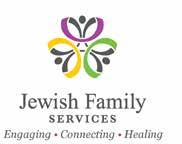
Volunteers: Jessica Alfandary, Phoebe Augustine, Marcia Arnholt, Mike Arnholt, Gail Baron, Daniel Benjamin, Andrew Bernstein, Suzy Catenazzo, Harvey Chessler, Dan Coblenz, Jonathan Collman, Andrea Cronson, Julie Dermack, Joni Deutsch, Dana Ditesheim, Sheryl Effren, Terri Fishman, Rachel Friedman, Meredith Gartner, Dave Gerrard, Marty Goldfarb, Richard Goldsmith, Jennifer Golynsky, Gail Halverson, Rebecca Hockfield, Oren Hubara, Tara Hubara, Dawn Hubbs, Bob
Jacobson, Mike Kaplan, Rikki Kinitsky, Jennifer Koss, Elliot and Stephanie Kreitman, Marcia Lampert, Eric Lerner, Kim Levy, Adina Loewensteiner, Matt Luftglass, Gene Marx, Frada Mozenter, Wendy Petricoff, Barbara Rein, Nina Rose, Marilyn Schuster, Janice Shubin, Cindy Siesel, Louis Sinkoe, Harry Sparks, Lauren Stark, Lorin Steifel, Steve Teich, Gail Vogel, Amalia Warshenbrot, Susan Webber, Nancy Wielunski, Amanda Zaidman
Live Laugh Give Volunteers: Meredith Baumstein, Andrew Bernstein, Andrea Cronson, Katherine Fainstein, Marlo Fox, Rachel Friedman, Blair Goldsmith, Marcia Lampert, Adina Loewensteiner, Rachel Peterson, Jodi Michel, Karen Ransenberg, Karen Silver
Special Thanks: Shai Fargian and Yafo Kitchen for donation of Passover meals
Jewish Family Services Tributes April 2023
For a Speedy Recovery
Josh Catenazzo
Matt Luftglass and Meg
Goldstein
Lily Hennes Ross
Sandra Weinstein
Get Well Soon
Carolyn Hennes
Sandra Weinstein
Happy Birthday
Leonard Marco
Paul and Lynn Edelstein
Rochelle Wilensky
Miriam Gold
In Appreciation of Sheryl Gerrard and JFS Senior Engagement Team
Francine Poznansky
Judy La Pietra
Francine Poznansky
JFS Senior Engagement Team
Salya Salamon
In Honor of Rabbi Judy Schindler for being named one of 25 Impressive Women
Helping to Shape
Charlotte in 2023 by Axios Charlotte
Stan Greenspon
In Memory of Ellen Dermack
Bonnie Dermack
Debra Dermack and Family
The Feldman Family
Richard and Dorothy Fox
Steve Hartstein
Nancy Kornhauser
David and Michelle Levi
The Melnitsky-Fradkin Family
The Rubin Family Harrison and Rabbi Rachel
Smookler
George and Aliza Spindell
Lori Trapani
Michael Warshawsky
focus is solely on the parent’s behavior. Studies show that the child’s anxiety and anxious behaviors will change as a result.

Anxiety often leads to a frustrating cycle of avoidance. For example, if someone is afraid of driving on the highway and feels anxious, nervous, panicky, and uncomfortable every time they drive on it, they may avoid it altogether. This avoidance may provide short-term relief, but it builds anxiety in the long run. In children, this avoidance can come in the form of parental ac-
tions, such as a parent going into the bathroom with their child each time they need to go. These actions are called “accommodations,” and in “SPACE,” the therapist works with parents to change parenting interventions to support children with anxiety and reduce the anxiety over time.
Many parents find “SPACE” empowering, especially when they feel overwhelmed by their child’s anxiety. For more information about “SPACE,” visit https://www.spacetreatment. net/. If you or someone you know is interested in “SPACE” or other mental health services, please contact JFS at (704) 3646594.
Hadassah Meal Preppies: Sharon Cavanaugh, Karen Futtersak, Meredith Glazer, Marci Golberg, Aileen Greenberg-Kriner, June Hirschmann, Yvette Jacobson, Johnson and Wales, Judy Kaufmann, Penny Krieger, Andrea McCleary, Stacy Mond, Helene Schillian, Elissa Vining, Linda White
Mitzvah basket donation: Vickie Neumann in honor of Samuel Lutwicks’s Bar Mitzvah
Sheldon Friedman
Milton and Karen Silver
Alwyn, Thelma, and Frances Goldstein
Stan Greenspon
Etta and Louis
Greenspon
Stan Greenspon
Leon Levine
Jill Blumenthal
Paul and Lynn Edelstein
Stan Greenspon
Jeff and Wendy Kornegay
Gary Silverstein
Kendall Ross
Suly Chenkin
Margie Levenson
Food Pantry Donations: Thank you to our generous community for continuing to donate to the food pantry. We continue to collect donations every other Wednesday at the portico entrance to the Blumenthal Center for Jewish Education Building at Shalom Park.
Joe Steiner
Stan Greenspon
Margie Levenson
Nathan Thrope
David and Beth Thrope
Mazel Tov
Cantor Shira Lissek on Reuben’s Bar Mitzvah
Stan Greenspon
The Charlotte Jewish News - June/July 2023 - Page 15
Hadassah’s Latest Achievements in Medicine and Helping At-Risk Youth
By Aileen Greenberg-Kriner
Yvette
Jacobson
and Gina Robins, our chapter co-presidents, attended the Hadassah Southern Seaboard Regional Conference in Virginia Beach in late April. Southern Seaboard includes several North Carolina Hadassah chapters, and others in Virginia and West Virginia. While Hadassah Charlotte Metro is just one of the eleven chapters in the Southern Seaboard region, and one of 700 U.S. chapters, we all have the same goal — fundraising for Hadassah’s many programs in the U.S. and Israel, including support for the Hadassah Medical Organization (HMO) in Jerusalem and Hadassah’s facilities for at-risk youth in Israel.
At the conference, the women participated in team-building
exercises, leadership training, state-level advocacy training, and most importantly, learned what Hadassah’s latest successes are in the HMO and its Youth Aliyah Villages in Israel.
Hadassah Medical Organization
Hadassah hospitals treat about one million patients each year, regardless of race, religion, or nationality. HMO hospitals’ main areas of expertise include cancer, cardiac care, emergency medicine/trauma care, women’s health, personalized medicine/ genetics, and stem cell research/ neurology. Our internationally renowned hospitals in Israel, Hadassah Ein Kerem,and Hadassah Mt. Scopus, are leaders in health care and research.
Conference participants
heard updates about recent, remarkable HMO achievements, including:
- Developing breast cancer
treatment protocols that are used throughout the United States, including at Duke University Medical Center.

- Sending medics to southern Turkey as part of a 230-member Israeli medical aid delegation following the devastating earthquake in February.
- Administering the first in the world (!) outpatient CAR-T Cancer treatment which was developed at Hadassah to treat Multiple Myeloma, AL Amyloidosis, and other BCMA-positive malignancies (types of blood cancers).
- Developing Organoid treatment, the first of its kind in Israel, at Hadassah Ein Kerem. Organoids offer researchers the reality of developing personalized cancerous tumor treatments.

Hadassah’s Youth Aliyah Villages
Conference participants learned how Hadassah’s Youth Aliyah Villages, Meir Shfeyah and Neurim, bring at-risk children from diverse backgrounds to live and learn together. The student body includes Jews, Druse, Muslims, Christians, and immigrants from around the world, including refugees from the war in Ukraine.
Almost half a million children in Israel suffer from highrisk situations, including abuse, learning disabilities, or a lack of basic needs. Young immigrants and at-risk native Israelis receive a full spectrum of help at the Youth Villages — food, shelter, counseling, education, and other supportive services. They learn Hebrew, take other classes, and get the care and attention they need to become productive members of Israeli society. Since 1934, over 300,000 students from 80 countries have graduated from Youth Aliyah.
Hadassah’s fundraising efforts, mostly raised through our chapter events, continue to support the HMO’s world-class healthcare and research, as well as Hadassah’s Youth Aliyah Villages.
Help support Hadassah. Save the date for…
…a fun “Israel at 75” party on the afternoon of June 25. There will be Israeli learning, food, and song to celebrate Israel. See Hadassah Charlotte Metro website for details.
…our major “Celebrate the Tatas” Fundraiser for Breast Cancer. This is a two-part event. Painting Days are Monday and Tuesday, August 28-29 at Temple Beth El. Painting days honor those with breast cancer and those who have been touched by breast cancer. Sign up to get your tatas painted! Thursday, October 26, is our fundraising event with lunch at Maggiano’s, a live auction, wine pull, and more. Email celebratethetatas.hadassah@ gmail.com if you want to volunteer or need additional information.
Summer Reading and Refreshments
Beverly’s Book Nook will meet on Friday, June 16, at 1:30 p.m. to discuss Code Name Sapphire by Pam Jenoff. We will talk about Kantika by Elizabeth Grover at the July 21 meeting.
Hadassah BookTalk will Zoom on June 27 at 7 p.m. and talk about “The Matchmaker’s Gift” by Lynda Cohen Loigman. On July 25, we will discuss “Once We Were Home” by Jennifer Rosner.
Short Story Discussion Group will not meet in June. At the July 14 meeting, at 11:45 a.m., we will discuss the first story in the book “Frankly Feminist: Short Stories by Jewish Women,” edited by Susan Weidman-Schneider and Yona Zeldis McDonough.
Come to Hadassah Wine & Schmooze on Tuesdays, June 6 and August 1 at 7 p.m. at Vintner Wine Market in Arboretum. There will be no event in July.
Helpful Hadassah Info

The next Hadassah Charlotte Metro Board meetings are Mondays, June 19 and July 17, at 7 p.m. via Zoom.
For more information about Hadassah Charlotte Metro, membership, or our events, please check our website, www. hadassahcltevents.org, email HadassahCLT@gmail.com or call our general number, (980) 553-1880.
Follow us on Facebook (Hadassah CLT Metro), Instagram (Hadassah Charlotte Metro), and Twitter (@HadassahCLT).

The Charlotte Jewish News - June/July 2023 - Page 16
Hadassah Hospital, Ein Kerem, Jerusalem





The Charlotte Jewish News - June/July 2023 - Page 17 on Morehead Luxury Retirement Living At The Village on Morehead, every detail of your curated lifestyle has been thoughtfully designed for you. Embrace your retirement years as you indulge in exquisite dining, socialize with like-minded individuals, pursue new hobbies, and engage in a wide range of programs in a place where you are inspired every day. e Village on Morehead 727 E. Morehead, Charlotte, NC 282022 Information Center 801 E. Morehead, Charlotte, NC 282022 START A CONVERSATION (704) 831-8000 or info@villageonmorehead.com Learn how you can become a member of Charlotte’s newest rental retirement community.
Tackling Antisemitism in Schools Through Partnerships and Education
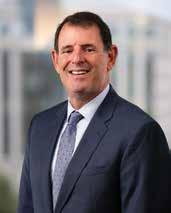 By Mitch Rifkin
By Mitch Rifkin
In early March, Jewish parents of children attending a local school contacted the North Carolina Holocaust Foundation regarding several incidents of bullying that involved swastikas, the Nazi salute, and hate comments referencing Hitler.
After meeting with these concerned parents and the principal, the Holocaust Foundation, in partnership with the Levine JCC Butterfly Project, the Jewish Federation of Greater Charlotte, the Stan Greenspon Holocaust and Social Justice Education Center at Queens University,
all currently involved in Holocaust education and combating antisemitism, created a plan to help faculty and students at the school gain a better understanding of Jewish culture, history, and the dangers of antisemitism.
The plan includes an educational seminar planned for
August 16 and a recent visit on May 2 by the school’s entire eighth grade to Shalom Park to attend the Levine JCC’s Butterfly Project. The school also has now incorporated the Jewish holidays into their school calendar.

The Butterfly Project cultivates empathy and social responsibility by using the lessons of the Holocaust to educate about the dangers of hatred and bigotry. Student participants paint ceramic butterflies that are displayed as symbols of resilience and hope, with the goal of creating 1.5 million butterflies around the world, one for each child who perished during the Holocaust, and honoring the survivors.
issues in the classroom and to experience sensitivity training on Jewish issues at school. This workshop will be presented by Judy La Pietra, the assistant director of the Greenspon Center.
If there are any questions about the programs and services provided by the NC Holocaust Foundation or to report any antisemitic incidents that occur in the North Carolina public school system, please contact Mitch Rifkin at rif121@carolina.rr.com or Michael Abramson at mabramson919@gmail.com.
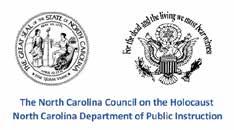
To support the work of the North Carolina Holocaust Foundation, please visit our website at https://ncholocuastcouncilworkshop.org or www.dpi. nc.gov/holocust-council/ . David
The in-person workshops at the school for teachers is to learn how to handle antisemitic
2023 Forbes “Best-in-State Wealth Advisors” list. Opinions provided by SHOOK® Research, LLC and is based on in-person, virtual and telephone due-diligence meetings that measure best practices, client retention, industry experience, credentials, compliance records, firm nominations, assets under management and Firm-generated revenue (investment performance is not a criterion). SHOOK’s rankings do not reflect any client experience, endorse any advisor, indicate future performance and are available for client evaluation only. Compensation was not received from any Advisors for the study. Details available at www.SHOOKresearch.com.
The Charlotte Jewish News - June/July 2023 - Page 18
Wealth Management Advisor 980.282.1784
Merrill Lynch Wealth Management 6000 Fairview Road Suite 600 Charlotte, NC 28210 fa.ml.com/the_vanglish_group
Van Glish, CFP ®, CRPC ™ Managing Director
david_vanglish@ml.com
Merrill Lynch, Pierce, Fenner & Smith Incorporated (also referred to as “MLPF&S” or “Merrill”) makes available certain investment products sponsored, managed, distributed or provided by companies that are affiliates of Bank of America Corporation (“BofA Corp.”). MLPF&S is a registered broker-dealer, registered investment adviser, Member SIPC and a wholly owned subsidiary of BofA Corp. Banking products are provided by Bank of America, N.A., Member FDIC and a wholly owned subsidiary of BofA Corp. Investment products: Are Not FDIC Insured Are Not Bank Guaranteed May Lose Value The Bull Symbol and Merrill are registered trademarks of Bank of America Corporation. CFP Board owns the marks CFP®, CERTIFIED FINANCIAL PLANNER™, and CFP® (with plaque design) in the U.S. The College for Financial Planning Institutes Corp. owns the service marks Chartered Retirement Planning Counselor™, CRPC™, and the CRPC™ logo, and the certification marks Chartered Retirement Planning Counselor™, CRPC™, and the CRPC™ logo. © 2023 Bank of America Corporation. All rights reserved. MAP4960336 | AD-05-23-0300 | 472538PM-1022 | 05/2023 Advice for what matters most, when you need it most Congratulations to David Van Glish for being named to the 2023 Forbes “Best-in-State Wealth Advisors” list, published on April 4, 2023. Rankings based on data as of June 30, 2022.
Bal Tashchit and Beyond: Eating for our Planet and Ourselves
By Rochelle Carney
Have you ever stepped outside during or just after a rain shower and seen a rainbow? If so, did it look so good you could eat it? Well, in a way you can, and in this article we will discuss how to use the rainbow image to eat in ways that will benefit your health and benefit our shared planet.
The “eat the rainbow” analogy has really taken off recently and makes it easy to remember a simple way to ensure you are getting a variety of natural vitamins and minerals in your diet. Just think of the colors of a rainbow (red, orange, yellow, green, blue, and purple) and try to choose fruits and vegetables with those colors to fill half your plate at each meal. This should achieve the current American Heart Association recommendation of four to five servings each of fruits and vegetables daily.
It is also important to remember how much better it is for your body to consume whole fruits and vegetables as opposed to just juice. Many of the most beneficial portions of the food, such as fiber, are contained outside the juice. These fiber-rich foods can help you feel full with-
out overeating and many studies show that fiber will help reduce cholesterol as well as lower your risk for heart disease. In addition, fruit juice purchased in stores often contains excess sugar, and generates food packaging waste. Combining the health aspects of eating the rainbow with sustainable practices can truly create the benefit of eating for your health and the health of the planet. Reducing meat consumption and replacing some meat products with vegetable products will
have a positive impact on both your health and the health of the environment. Growing your own fruits and vegetables is an even better local option with the added benefit of being able to compost fruit and vegetable scraps back into your garden — the cycle continues!
In addition, while we all love fresh fruit all year round, the reality is that purchasing fruit out of season is often not sustainable as they most likely travel long distances to reach your store. This additional shipping will increase the level of greenhouse gas emissions, which contribute to acid rain, air pollution, and global warming. Focusing on eating seasonally and locally goes a long way toward reducing the impact of food transportation. Eating seasonally has many other benefits as well, including the introduction of diversity into your selections through natural seasonality. Rather than buy strawberries all year, switch to cranberries or pumpkin in the fall. Pumpkins contain carotenoids which, besides giving them their orange hue, neutralize free radicals and help prevent wrinkles. Pumpkins are
also packed with vitamins A, C, and E.
In addition, tending our own gardens and eating locally also reduces the amount of packaging waste that ends up in our landfills. Of course, it is not likely to be possible for us to grow enough fruits and vegetables in our backyard gardens to feed our families all year, so keep an eye out for local farmers markets and choose food with minimal or reusable/recyclable packaging. The less packaging a food has, the less energy and chemicals expended, and the less overall waste produced. One idea for fruit clamshells, which are not typically recyclable in curbside bins, is to take them back to one of the various farmers’ markets around town where many larger family farms can use them to package their own crops. In addition, the Bulb (https://www. thebulbgallery.org/) located at the Innovation Barn (https:// envisioncharlotte.com/innovation-barn/) at 932 Seigle Ave., is currently accepting clamshells and 12 count egg cartons for local use.
As with many health and sustainability initiatives, it’s not al-




ways possible to eat the rainbow at every meal, or to eat locally and seasonally for everyone all the time. Perfection isn’t the goal! The important thing is to be aware of the choices we are making and their impact on our health and on the world around us. This awareness makes it easier to choose options that apply these concepts when and where you can.
Jewish tradition teaches the importance of caring for the environment, for we must act as partners in preserving creation. If you are interested in donating your time or dollars to Shalom Green, please visit our website at www.shalomgreenCLT.org and email us at info@shalomgreenCLT.org. Connect with us on Facebook at Shalom Green: Shalom Park Environmental Initiative and on Instagram and Twitter @shalomgreen_CLT.

The Charlotte Jewish News - June/July 2023 - Page 19 With 29 offices coast to coast – including four locations in the Carolinas – Fox Rothschild offers mid-market businesses the best of both worlds. Clients get the robust services of a national law firm with more than 70 practice areas, delivered by accessible attorneys who know the local courts and understand their market. YOU
A LAW FIRM WITH NATIONAL RESOURCES AND A LOCAL PRESENCE. WE HEAR YOU. 101 N. Tyron Street, Suite 1300 Charlotte, NC 28246 CHARLOTTE | GREENSBORO | RALEIGH | GREENVILLE, SC Brian C. Bernhardt 704.384.2607 bbernhardt@foxrothschild.com Alexandra J. Hirsch 704.384.2641 ahirsch@foxrothschild.com
WANT
Green Sprouts learn why different foods are good for different parts of the body at their April meeting.
By Ken Garfield
When Leon Levine passed away on April 5 at age 85, his business achievements were chronicled worldwide, how a small-town kid from Rockingham, N.C., founded the Family Dollar empire. By the time Mr. Levine retired in 2003, there were 4,300 stores in 44 states. The second chapter to his story is equally powerful. The Leon Levine Foundation, since its founding in 1980, has given $450 million to support Carolinas organizations working in human services, health care, education, and Jewish values.
There is more to the story. It is the love Mr. Levine shared with his family. The personal and professional friendships he forged in Charlotte and beyond. His commitment to his faith. The joy and laughter that graced the journey.
The Charlotte Jewish News is pleased to share these personal stories from friends and loved ones. These vignettes were part of a very good life. Leon Levine’s life.

A Sense of Responsibility
Sue Worrel’s admiration for Leon and Sandra Levine dates back to 2005 when they welcomed her into their home. The occasion? A job interview for the position she landed — chief executive officer of the Jewish Federation of Greater Charlotte.


Starting that day, Sue began to appreciate Mr. Levine’s devotion to the Jewish community. Since its formation in 1980, The Leon Levine Foundation has given $61 million to Jewish causes and institutions, $43½ million of that to the Charlotte region. Among the donations are $15.1 million to the Foundation of Shalom Park and $5 million to the Sandra and Leon Levine Jewish Community Center. The Jewish Federation of Greater Charlotte has been the beneficiary of nearly $20 million in gifts and grants from the Levines and The Leon Levine Foundation.
Over the years, Sue experienced Mr. Levine’s graciousness, curiosity, and generosity, not just with his resources but with his time. Even before the first brick was laid in the mid-1980s, he recognized how Shalom Park could serve as the center of Jew-
ish life in Charlotte. “He had a sense of responsibility for what the Jewish community needed,” she says. He was also committed to the State of Israel and its importance to Jewish communities worldwide and supported it accordingly.
Mr. Levine’s smile said it all, Sue says. It was genuine, kind, and heartfelt. It launched meaningful conversations about the things he held close to his heart. His faith. A better future. Jewish continuity.
“When he saw you, his face
would light up,” Sue says. “He would flash that smile, and you couldn’t help but smile right back.”
‘Hold Your Horses, Levinson’


Leon Levine was a vital part of the movement that built Shalom Park in 1986. A decade or so later, he was an equally vital part of the effort to expand Shalom Park from 75,000 square feet of heated space to 225,000 square feet of heated space.
The growth of Charlotte’s Jewish community demanded a bigger park – a place of worship, study, social action, recreation, and fellowship. If you don’t fully appreciate Mr. Levine’s contribution to the expansion, ask Hal Levinson. As president of the Foundation of Shalom Park, it was Hal who was on the receiving end of Mr. Levine’s admonition (more than once, always with a playful wink!), “Hold your horses, Levinson.”
Hal smiles at the memory. At Mr. Levine’s urging, the $42 million expansion incurred no debt. His hold-your-horses warning was followed by “We’re not ready to do that yet. We don’t have the money in the bank.” The Levines’ generosity added to that money in the bank. So did their insistence that this be a community project supported by all who wanted Shalom Park to be everything it needed to be.
“He inspired many others to give,” Hal says. “What was very important to Leon was that it didn’t just involve him, his family, and a few others. He understood the importance of community partnership.” Mr. Levine emphasized that point, Hal says, again smiling. “Sometimes quietly, sometimes not so quietly.”
You Want To Test Me?
Harry Swimmer and Leon Levine were friends for 68 years, ever since Harry drove to Mr. Levine’s native Richmond County and sold him a $48 car insurance policy. Their relationship went far beyond insurance, their years together rich with stories.
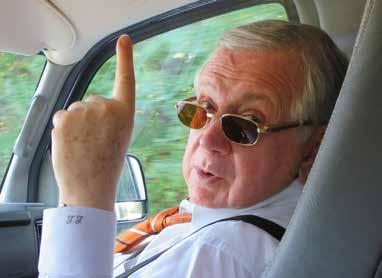
Back in the day, Harry took his pal to play tennis. Mr. Levine
even purchased an outfit for the occasion. “He lasted about 15 or 20 minutes,” Harry recalls. “He said ‘This isn’t for me.’”
One day at the beach, Mr. Levine took Harry to his favorite place to eat. Barbecue and hamburgers to die for. Perhaps literally. “It was a dump,” Harry remembers.
Once after a Family Dollar store burned down, Harry and Mr. Levine flew on a private plane to assess the damage and settle the claim. Thinking Mr. Levine was asleep (his eyes were closed!), Harry suggested to fellow travelers that they haul the goods outside and sell them under a tent. Harry finishes the story. “He opened his eyes and said, ‘You want to test me?’” I thought he was sleeping. He didn’t sleep when someone was talking business.”
Says Harry, “We loved each other.”
He Taught Us a Lot About Life
Howard Levine at 64 is the oldest of the Levine children. Ask him about his father and he talks not only of business, philanthropy, or devotion to the Jewish community. He talks of summers at Myrtle Beach, S.C. Those family vacations back when he was 10 or so have never left his heart.
They’d rent a house on the ocean. Howard doesn’t recall his dad conducting any business other than visiting Family Dollar stores on the way down. What he remembers are trips to the Pavilion. Mr. Levine used to ride the bumper cars with Howard. Dinner at Aunt Maude’s. Mr. Levine loved the fried chicken at the all-you-can-eat restaurant. Then came ice cream at Painter’s. The
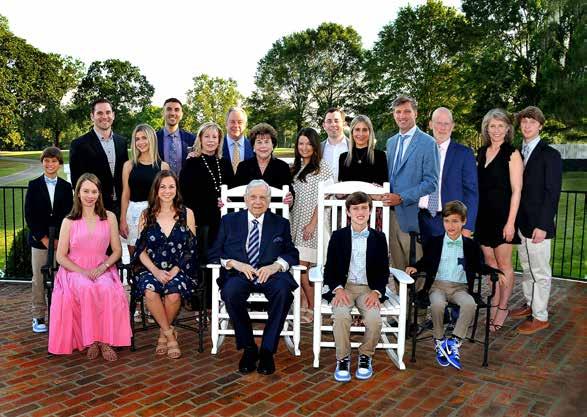
The Charlotte Jewish News - June/July 2023 - Page 20
Leon Levine and Family
When he saw you, his face would light up,” Sue says. “He would flash that smile, and you couldn’t help but smile right back.
Sue Worrel
“ “
family took videos of the kids playing on the beach. They used one of those clunky hand-held video cameras. Howard wishes he knew what happened to that footage from a lifetime ago.
It’s not only the big things we remember about a mother or father. It’s summers in Myrtle Beach, and memories that you cling to.

To Help Others in Need
It is no accident that Lori Sklut with her husband, Eric, has devoted her life to philanthropy. How could Leon Levine’s daughter not have a heart for helping others?
Lori worked in Family Dollar stores growing up. When she graduated from the University of Georgia, she became a Family Dollar buyer. She loved purchasing merchandise for children, giving moms and dads the chance to dress their little ones in beautiful, affordable things. In the mid-1980s, Lori heard the call to philanthropy. She sought her father’s counsel. He suggested she and her siblings begin by donating to Shalom Park going up off Providence Road, specifically the indoor swimming pool. That pool, a gathering spot for families, is named for Mr. Levine’s first wife, Lori’s mother, Barbara Leven Levine. Cancer took Barbara in 1966. She was 27.
Today, the Levine-Sklut Family Foundation supports Jewish and faith-based institutions, educational institutions, human services, healthcare services, and the arts.
Lori’s father helped her find her way. “He taught me humility. To help others in need. To be truthful. And to have a sense of humor.”
A Life of Tikkun Olam
Mason Sklut shared the charitable side of his grandfather’s life at the service celebrating Mr. Levine’s life.
“In the Talmud, one of the sages said, ‘Anyone who performs charity and justice is considered as though he filled the whole world in its entirety with kind ness,’” Mason told the gathering. “There could not be a more ac curate description of Grandpa’s legacy. He lived a life of tikkun olam, repairing the world and providing what was missing to make it a better place. He was an inspiration for us all.”
Mason also shared the light er side of Pop-Pop, as he called him.
Son of Eric and Lori Sklut, Mason is 31. He was 12 when he flew with his grandfather and other family members to Hous ton in 2004 to cheer on the Pan thers in the Super Bowl. Halfway there on the Family Dollar plane, Mason told his dad he was feel ing queasy. Pop-Pop heard this and, being the decisive lead er that he was, offered Mason advice. “Open the window if you’re going to vomit.” Thank fully, there was no need.
On one family vacation to Myrtle Beach, S.C., the Levines left their beach chairs in the sand for their return. Stepping out on the balcony the next morning, Mr. Levine spotted interlopers occupying the chairs. Not for long. “WILL THE PEOPLE SITTING IN THE LEVINE BEACH CHAIRS REMOVE
Says Mason, “It sounded like he was on an intercom. Those people have never moved faster.”
Mason closed his talk with this: “And lastly God, if you’re listening, please make sure Grandpa has a good supply of Krispy Kreme doughnuts and Dairy Queen…”
He Was Always Ready to Help
During his 25 years at Temple Israel, Senior Rabbi Murray Ezring took many of his ideas first to Leon Levine. He appreciated Mr. Levine’s interest, questions, and counsel.
Rabbi Ezring also knew where to turn when trouble arose, like the evening raindrops kept falling on his head during a Kol Nidre service. Mr. Levine helped raise the money to get the leaky roof replaced – an example of him rising to the occasion in
matters of faith large and small. “He was always ready to help get done what needed to get done,” Rabbi Ezring says.
Rabbi Ezring currently serves as interim rabbi at Congregation Beth Israel in Owings Mills, Md. For his many years of service, Temple Israel named him Rabbi Emeritus.

A Smile on His Face
Leon and Sandra Levine and Larry and Dale Polsky go back 27 years. Larry serves as a senior adviser and board member at The Leon Levine Foundation. They enjoyed cruises and traveled the world together. On one trip to China, Mr. Levine showed exactly why he succeeded in getting Family Dollar goods at the best prices possible.
They were in a store that sold Chinese products. Mr. Levine spotted terra cotta figurines, Chinese soldiers, some of them more than six feet in height. Wouldn’t they look good at their home in Charlotte? That’s when Larry and Dale saw Mr. Levine in the corner of the store, in a heated conversation with an employee, perhaps the manager. You can figure this out. Mr. Levine bought six figurines, maybe more. When the Polskys admired a Chinese screen for sale, Mr. Levine got that at a lower price, too. “You should have seen him with a smile on his face after a good negotiation,” Larry says.
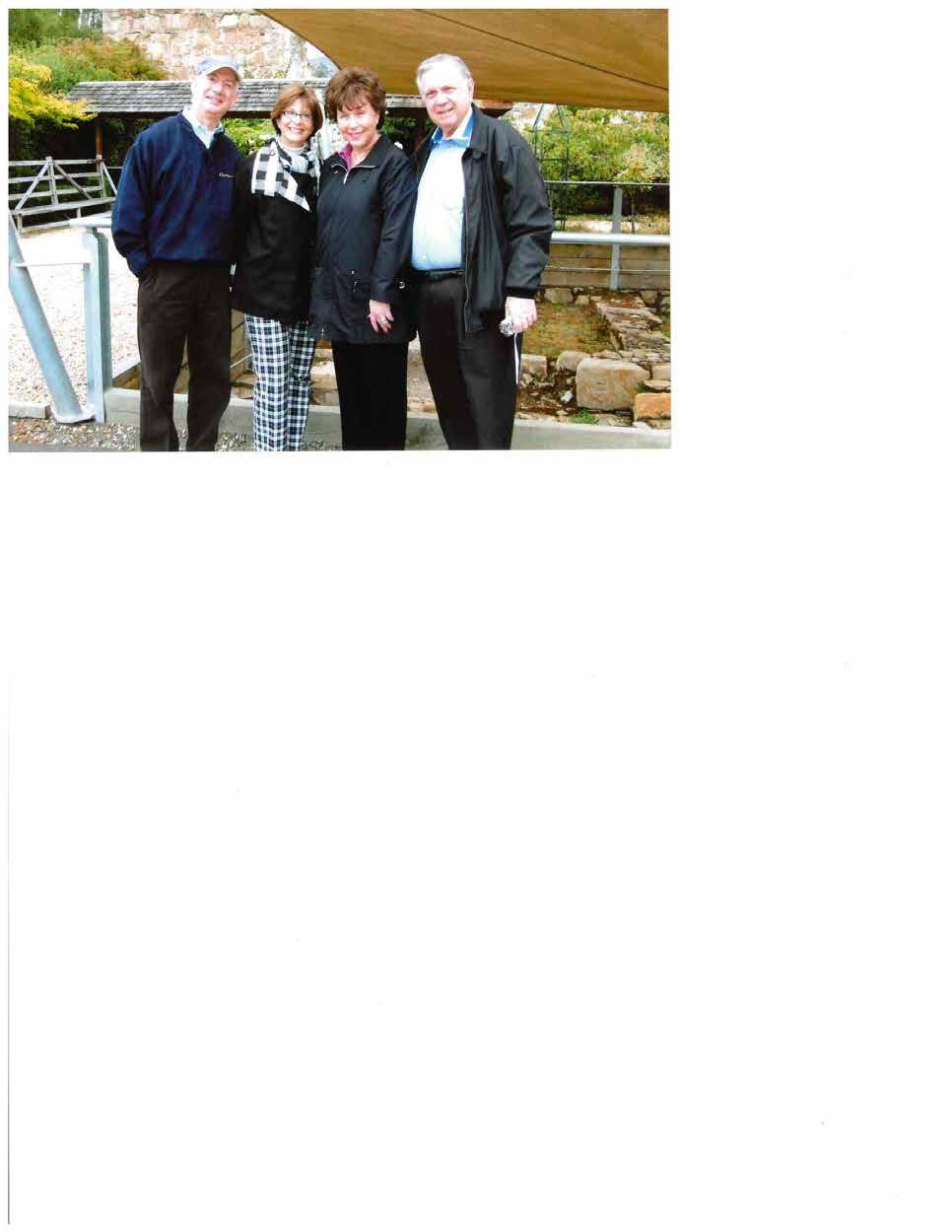
_ _ _ _ _ _ _ _ _ _ _ _ _ _ _ _ The Charlotte Jewish News - June/July 2023 - Page 21
He taught me humility. To help others in need. To be truthful. And to have a sense of humor.
“ “
Lori Sklut
He was always ready to help get done what needed to get done
“ “
Rabbi Murray Ezring
Larry and Dale Polsky, Sandra and Leon Levine in Australia, 2008
Faith and Gratitude: Reflecting on Twenty Years in the Cantorate
Cantor Mary Rebecca Thomas

Matthew and I arrived to Charlotte in May 2003. The previous February, Matt was offered a job at Bank of America, which he wanted to pursue. I had already taken my GREs and begun an application process to the Reform movement’s seminary, Hebrew Union College — Jewish Institute of Religion. Without much of a second thought, I agreed to put my application on hold and move. We drove to our Uptown apartment straight from my college graduation. I felt like we were pioneers, embarking on a journey to an entirely new world with new cultural norms and places to explore.
There have been times when

I look back on the initial decision to move to Charlotte and reflect on how risky that decision was. How could I put my graduate work and career on hold and move to another state? What does a person with a BA in History and Jewish Studies do in North Carolina? Would I be putting my dreams and plans on hold? In retrospect, it seems like this should have been a complicated decision, but I chose to move to Charlotte and never looked back.
What unfolded for me the summer I arrived here was nothing short of life-altering. The staff of Temple Beth El (TBE) welcomed me with open arms and took me under its wings. I had opportunities for work, for learning, and for community. From 2003-2006, I learned what a vibrant Jewish community could look like. I remember tiny details of people and places, and how hard I worked to grow into the responsibilities that were entrusted to me. Most of all, I remember the generosity of Cantor Bernard, Susan Jacobs, Rabbi Schindler, and countless others.

After three years in Charlotte,

Matt and I moved to New York so I could pursue my MA and Cantorial Ordination at HUC. In 2011, I rejoined the staff of TBE, now as cantor. The twelve years since have been profoundly rewarding and enriching. I have immense gratitude for the privilege of walking beside members of our community through the greatest joys and sorrows, on the ordinary days and at their peak experiences, and in those moments when people have shared that they, too have recognized something in their own lives to be b’sheret — meant to be.
Our move to Charlotte was the first time in my life that ever felt truly b’sheret. I could never have anticipated the opportunities that I found here. Growing up in a small, urban New Jersey Jewish community, I had no real sense of the large suburban synagogue or even really what a cantor did, only that I was sure I wanted to be one. By the time I began my graduate seminary work at HUC in the summer of 2006, I was not sure how I could have been successful at HUC without the experience and education I had gained in Charlotte. It was
clear to me then, as it is now, that the three-year detour to Charlotte was always meant to be a part of my journey.
In the years since, I have made many decisions that were far less straightforward than the initial decision to move to Charlotte. Life seems to become more complex as we go on living and, thus, our decisions are tougher because they now account for the nuance that our experience has introduced into our understanding. I think this is how life transforms our personal Torah and informs the seeds of the wisdom that emerges as we age.
I have sometimes longed for the simplicity of the decision to move to Charlotte. The decision to move on from my role as cantor of Temple Beth El was certainly one of the hardest that I have ever made. And yet, once that choice finally became clear, I had an overwhelming sense of peace that it was the correct step and, once again, b’sheret.
There is a push and pull in our human decision-making, that which the head or perhaps the heart wants, and that which the still, small voice inside of us
might urge us to do. There is that which is part of our consciousness and that which is beyond. There are paths that we have the agency to forge and others still that we might allow to simply unfold before us. Allowing ourselves to listen and follow our innermost desires is not an act of risk-taking, but rather one of deep faith.
In Likutei Mohoran, Reb Nachman of Breslov teaches that exile comes from a lack of faith, emunah, which is intrinsically linked to prayer. “For prayer transcends nature; the natural course dictates a certain thing, but prayer changes nature’s course. This is a miracle. And for this, one needs emunah. A person has to believe that there is a M’chadesh (God who Renews) with the power to renew the world.”
May we have the courage, the faith, and the trust to heed the quietest utterances that beckon us forth, moving on with gratitude for where we have been and curiosity about what lies ahead.
The Charlotte Jewish News - June/July 2023 - Page 22
Dr. Ryan Matthews, DMD Prosthodontist/General Dentistry
Dr. Ron Cohen, DDS
Dr. George Soung, DDS, FAAOMS, FACOMS Board Certified Oral Surgery
Offering General Dentistry, Orthodontics,and Oral Surgery ➔•f invisalign ® • PROVIDER 11840 Southmore Drive Suite 150 Charlotte, NC 28277 The dental office is located inside the Novant Health Building at Waverly www.waverlydentalgroup.com 704 • 246 • 7677 Religious Life
Dr. Dr. Alex Edelman DDS Board Certified Orthodontist
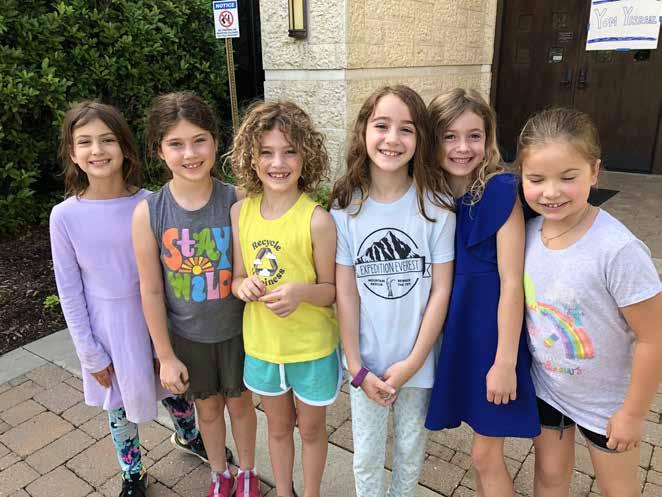
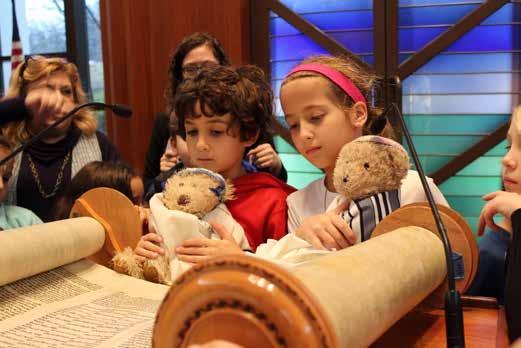
The Charlotte Jewish News - June/July 2023 - Page 23 WWW.TEMPLEBETHEL.ORG | 704.366.1948 Religious School REGISTER NOW! A COMMUNITY of friends IN-PERSON & online options SMALL GROUP Hebrew Study WWW.TEMPLEBETHEL.ORG | 704.366.1948 YOU WE WELCOME SINGLE • COUPLE • DIVORCED • MARRIED YOUTH • TEEN • YOUNG ADULT • FAMILY • SENIOR SEEKER • SKEPTIC • PROGRESSIVE • TRADITIONAL LGBTQ+ • NEW TO CHARLOTTE • NATIVE CHARLOTTEAN oever you are, JOIN NOW! MAKE YOUR TEMPLE COMMITMENT TODAY
L’chaim
temple beth el
Ch rs to 80 Years
An evening of celebration and fundraising featuring live music from Marilyn McCoo and Billy Davis, Jr. of The 5th Dimension
HONORING
Sam & Emily Zi
The Charlotte Jewish News - June/July 2023 - Page 24
“Judaism: The Soundtrack” An Evening of Song, Storytelling, and Inspiration in Charlotte at Chabad
This summer, Chabad of Charlotte will offer a fantastic musical event titled “Judaism: The Soundtrack,” an evening of immersive musical experience, featuring Jewish Chasidic melodies, fascinating narratives, and motivational messages which seek to inspire, educate, and uplift the Jewish spirit within us.

The program is being produced by the world-renowned Jewish Learning Institute (JLI), which has brought many enlightening educational opportunities to Charlotte over the past 23 years.
On Sunday, June 25 at 7:30 p.m., participants will discover the enthralling world of Chasidic melody and the deep spiritual meaning behind its tunes. Inspiring visuals, captivating stories, and rousing song will work in harmony with Chasidic wisdom to create a spectacular production that will touch the heartstrings and elevate the spirit.
“These Chasidic melodies are like no other.” Says Rabbi Yossi Groner of Chabad of Charlotte. “They tell a soul-stirring story about life’s purpose and what truly matters in this world. There is so much that can be learned from these moving tunes, and I look forward to sharing these transformative teachings with
our community.”
The event is in honor of the 29th Hilula of the Lubavitcher Rebbe, Rabbi Menachem M. Schneerson, who has revolutionized the engagement of Jewish life in communities all over the world. The Rebbe’s anniversary of passing is on the 3 Tamuz, which falls on June 22, 2023.
Like all JLI programs, this event is designed to appeal to people at all levels of knowledge, including those without any prior experience or background in Jewish learning. All JLI programs are open to the public, and attendees need not be affiliated with a particular synagogue, temple, or other house of

worship.
A pre-reception will be held at 7 p.m. with wine and gourmet delights. This event will be held at the Epstein Family Chabad Center, 6619 Sardis Road, Charlotte.
A nominal fee of $10 per per-
son will help defray the cost of the event. For more information, and registration, please visit chabadnc.org/soundtrack or call the Chabad office at (704) 366-3984.
Summer Shabbaton to Bring Out Delightful Flavors of Shabbat
Friday night Shabbatons are filled with joy, camaraderie, and fantastic food. Most of all, the spirit of Shabbat comes through with song, storytelling, and uplifting activities.
On Friday, June 23, a fantastic summer Shabbaton will be held at Chabad of Charlotte, featuring delicious summer fare and an array of fine international kosher wines. The Chabad Shabbatons are legendary in bringing out the delightful flavors of Shabbat, both in its food and in its spirit.
Summer is a time of brightness both in the physical and spiritual sense. The Shabbaton at Chabad is a great way to embrace the bright days and late nights of the summer season.
The June Shabbaton is dedicated to the 29th Hilula (anniversa-

Uptown Chabad Hosts Pesach Seder With 90+ Jewish Professionals
On the first night of Pesach, the Uptown Chabad hosted a joyous seder for more than 90 attendees in the South End neighborhood of Charlotte. The event brought together young Jewish professionals to celebrate the holiday of freedom.
Led by Rabbi Motti and Chaya Groner, the seder was filled with lively singing, insightful discussions, and, of course, delicious food. The tables were adorned with traditional Pesach fare, including matzah, maror, and charoset, as well as a variety of other holiday dishes. Attendees were also treated to a selection of fine wines to enhance the holiday experience.
Throughout the evening, Rabbi Groner shared some thoughts about the holiday and its customs, engaging attendees in discussions about the themes of the seder and their relevance to contemporary life.
The lively atmosphere of the seder was further enhanced by the warmth and camaraderie
of the attendees. Young Jewish professionals from all walks of life came together to share in the joy of the holiday, forming new connections and strengthening existing ones.
Overall, the Uptown Chabad’s Pesach seder was a resounding success, bringing together a diverse group of young Jewish professionals to celebrate the holiday of freedom in a meaningful and joyous way. The event was a testament to the power of community and the importance of celebrating our traditions with others.
To learn more about the Uptown Chabad, visit theuptownchabad.com.

ry of passing) of the Lubavitcher Rebbe, Rabbi Menachem M. Schneerson, who was the ultimate optimist. The Rebbe sought to rebuild Jewish life after the terrible destruction of the Holocaust and to inspire Jews worldwide with a sense of hope for a better future. The Rebbe’s care for every individual Jewish person was expressed by his sending his representatives to Jewish communities the world over, large and small, instilling a sense of Jewish pride and joy to young and old.
The theme of the Shabbaton is Jewish pride through Torah. There is much talk about antisemitism and how to counter it. The first step is to infuse Jewish pride in Jewish people, which comes through Jewish knowledge and immersion in Jewish life. The
key is in bringing the authentic Jewish experience in an exciting and meaningful way to Jewish people today.
The Shabbaton will be highlighted by a delightful Shabbat gourmet dinner, prepared by Kosher Charlotte. The menu will include delicious summer desserts and a variety of kosher wines from around the world. A children’s program will feature engaging Shabbat fun activities.
The Shabbaton will be held at the Epstein Family Chabad Center on Sardis Road on Friday. June 23rd at 7 p.m. Cost for Shabbaton is $36 per person and $15 per child.
For more information and registration, please visit chabadnc. org/shabbaton or call the Chabad office at (704) 366-3984.
The Charlotte Jewish News - June/July 2023 - Page 25 Religious Life
Yom Ha’atzmaut: More Than One Day
 By Rabbi Chanach Oppenheim
By Rabbi Chanach Oppenheim
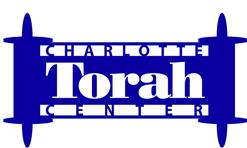
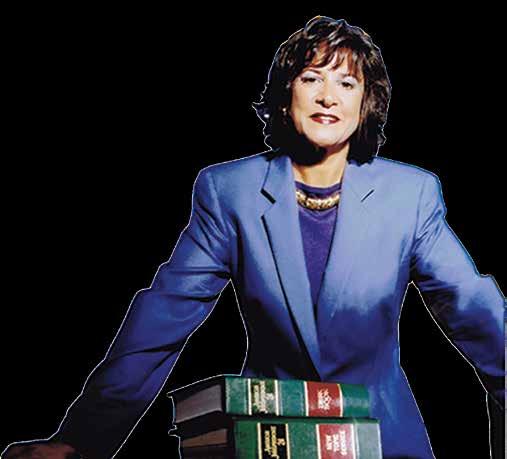
The Yom Ha’atzmaut community celebration was enjoyable and memorable. Jewish Federation of Greater Charlotte’s idea to bring two IDF soldiers to speak with CJP, CJDS, BBYO, Queens University Hillel, Oasis, and others really covered the bases of all ages of Jews. This annual event is important and recognized in Jewish communities throughout America, but how do we recognize the values and ideas it represents throughout the rest of the year? High school and college students feel intimidated by the anti-Israel and antisemitic rhetoric they hear in school and on campus. How can we take the message, lessons, and great spirit of Yom Ha’atzmaut with us for the rest of the year and be proud to defend our Jewish identity and the right of Israel to exist?
I don’t have a definite answer, but here’s a thought based on an ancient Midrash about what our people accomplished by creating the State of Israel.
A man was traveling from the Land of Israel to Babylon when he saw two birds fighting to the death. One bird killed the other and then brought back a certain grass that revived the dead bird. The man thought that he could use this grass to revive the dead in Israel. When he returned home, he saw a dead fox and decided to test the grass on it. He applied the grass and the fox came back to life. Then he saw a dead lion lying on the road and decided to test the grass on it as well. The lion came back to life and devoured the man. The Midrash concludes with a proverb: “If you have done good to a bad one, you have done bad. Don’t do good to a bad one, and no bad will befall you.” (Midrash Rabbah Vayikra 22:4).
This dramatic story describes the graphic history of the Jews. For centuries, we wandered throughout the world and brought a “life-giving grass” with us that provided energy and creative power to the lifeless of our host countries. Numerous cities, villages, industries, and cultures owe their very existence to the Jews. Yet, we always remained in the category of a homeless and wandering pariah. Finally, we came to the realization that if the Almighty had endowed us with this special creative and life-saving talent, why remain forever homeless, stateless, and alone? We said to ourselves, “Let us go to our ancestral homeland and revive the dead in the Land of Israel by applying this life-sustaining force for our own people.”
And so we did. The land we entered was stripped and poor. The soil was stony and eroded, the waters were polluted and malaria-infested, and the cities and hamlets were dirty and disease-ridden. But with our arrival, a radical change began to take place. We initiated a dramatic period of building, irrigating, and cleaning that astonished the world. Against enormous odds, we drained the marshes and the swamps, cleared the roads and removed the rocks, pruned, planted, and harvested.
The neighbors were starving. The eyes of many were sightless from trachoma, and the bones of their children were malformed from lack of proper nourishment. In a little while, the Jews raised their standard of living and brought healing to the starving “foxes.”
Then we had an encounter with the lion. When the British lion was badly mauled at El Alamein, our youth rushed to its rescue. With their own lifeblood,
young Jews helped resuscitate the wounded and bleeding lion. But no sooner had that come to pass, when Britain turned upon its benefactors, struck out at them, and tried to devour Jewish settlement.
Fortunately, the story of our people’s adventure has a happier ending than in the Midrashic tale. Our people fought back, drove the ungrateful lion out, and created the State of Israel.
The story is not yet over. There are still foxes, lions, bears, and an assortment of other beasts to contend with. Throughout this year, celebrating the 75th anniversary of Jewish Statehood, we dedicate ourselves anew to the idealism and determination of the early pioneers. We hope and pray that the life-giving and life-sustaining powers with which the Almighty has blessed us will enable us to outlive
the nefarious designs of all the “beasts,” and that in our lifetime we will achieve the peace and security we so desperately want and need. Amen.
Temple Solel Keeps Up With Struggles of Reform Jewish in Israel

 By Dale Rivers, Temple Solel Vice President
By Dale Rivers, Temple Solel Vice President
Most Jews would like to know how decisions in Israel are affecting everyday life there. Newspapers and TV pieces give the headlines, but not the effects. Fortunately for members of Temple Solel, we have a “man on the ground” and dear friend in Rabbi Steve Burnstein. He is a member of the Israel Movement for Reform and Progressive Judaism and the spiritual leader at Kehilat Birkat Shalom, our sister congregation at Kibbutz Gezer. But to members of Temple Solel, “Rabbi Steve,” as he is lovingly known, gives us regular reports on what is really going on in Israel – what it all means to the men and women and families who live there.
For several years he has visited us in Fort Mill to share the human side of life in Israel. We have been treated to his stories about raising kids in Israel, their experiences in the Defense
Forces, the problems of performing non-orthodox marriages there (it’s illegal!), and other perspectives we could never get from any media accounts.
The current situation in Israel is unlike anything we have seen before, and to really understand what it all means, it really helps to have someone like Rabbi Steve to provide and insider’s view. On Sunday, June 11th,
Rabbi Steve will be giving the
members of Temple Solel another briefing on what’s going on and the potential impacts to everyday life. Since he is still in Israel, the briefing will be over Zoom. We invite all members of the Greater Charlotte Jewish community to listen in. The Zoom link can be found on Temple Solel’s website: www. templesolelsc.org.
If this sounds like a Jewish Temple you might find attractive, come by and meet us. Tem-
The Charlotte Jewish News - June/July 2023 - Page 26
Estate Planning Estate and Trust Administration Pre-Marital Agreements Charitable Planning and Entities General Corporate and Tax Law Business Succession Planning 5401 Lancelot Drive Charlotte, NC 28270 704.846.3607 office 704.756.3626 cell MGOLDSTEIN@MGOLDLAW.COM WWW.MGOLDLAW.COM Meg D. Goldstein Attorney-At-Law Religious Life
Rabbi Steve Burnstein
The Ruach Leads the Shabbat for Good
By Greg Garrison
Good
Shabbos.
We have probably all heard and offered this traditional Sabbath greeting countless times throughout our lives without really giving it much consideration. Well, The Ruach has thought a great deal about these words and as a result, we are introducing “Shabbat for Good.”
You may be wondering what we mean by “Shabbat for Good.” After all, every Shabbat is good and has been since the creation of the universe. Observance of Shabbat can be seen as a reminder of the purposefulness of the world and the role of human beings in it. It is with this in mind that The Ruach is embarking on a program to combine worship with a mission-based service program. The Shabbat for Good will showcase charities with which we will be collaborating and providing funds as acts of loving kindness and tzedakah. By joining hands and feet with hearts, mouths, and intention, we can continue to make an impact throughout Charlotte and beyond.
Over the past two and a half years The Ruach Community,
through our Grab-n-Go Lunch program, has delivered more than 1,000 meals to Roof Above, a comprehensive homeless service provider with a spectrum of services ranging from street outreach, day services, emergency shelter, and permanent supportive housing. And in April, through our Pillows of Hope initiative, we donated 180 pillows to Roof Above.
At our inaugural Shabbat for Good on Friday, May 26 we highlighted World Central Kitchen (wck.org). World Central Kitchen is first to the front lines, providing meals in response to humanitarian, climate, and community crises worldwide. Last year, Charlotte’s only Jewish Smokemaster, Robert “Ernie” Adler, went to Poland as a World Central Kitchen volunteer, feeding Ukrainian refugees of the war that resulted from the invasion of Ukraine by Russia. At this first Shabbat for Good, Ernie provided meals, with a portion of the proceeds from the food sales being donated to World Central Kitchen.
In October, the Shabbat for Good will team up with the Charlotte chapter of Hadassah
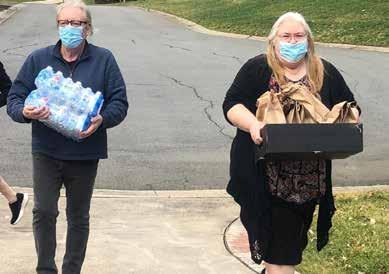
(www.hadassahcltevents.org) and Carolina Breast Friends (carolinabreastfriends.org) for Breast Cancer Awareness Month. The mission of Carolina Breast Friends is to embrace the breast cancer community in a positive environment by providing resources and education through fellowship and mentoring during any stage of the journey.
The Ruach is speaking with other organizations to support
through Shabbat for Good and will be announcing these as soon as details are finalized. We are always looking for other organizations with which we can work in partnership. If you and your nonprofit charitable organization would be interested in teaming up for a Shabbat for Good, let us know by emailing us at the. ruach.band@gmail.com.
In other news, The Ruach band was honored once again this year to be the headliner for Temple Emanuel’s Greensboro Jewish Festival held on March 26, 2023. We are thrilled to announce that we have already been asked to return as the headliner for next year’s festival to be held on April 7, 2024.
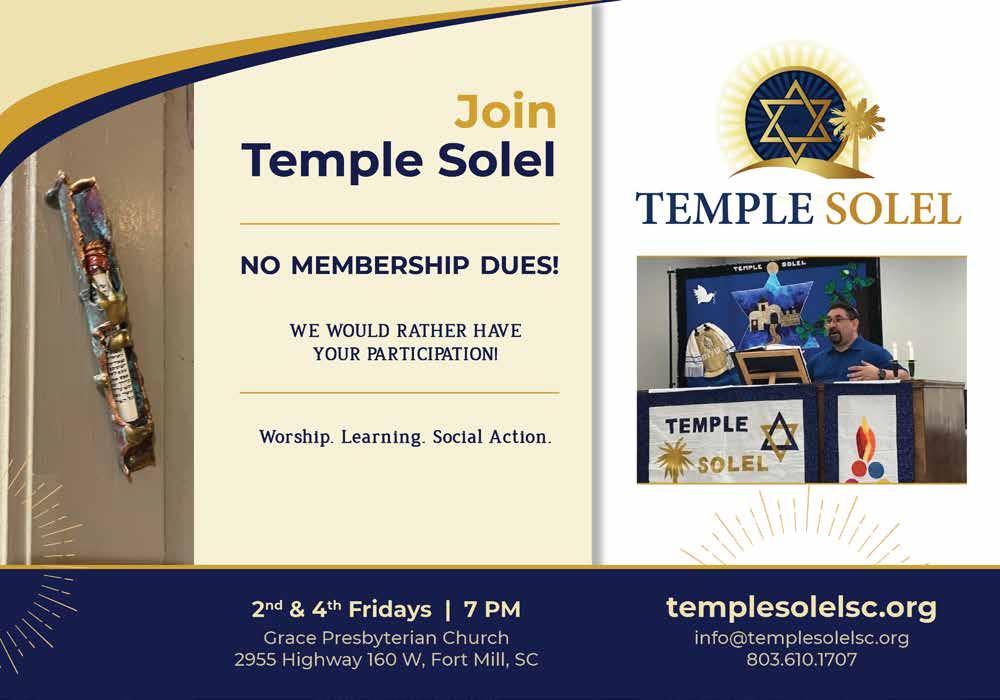
The Ruach is a 501(c)(3) North Carolina non-profit organization based in Charlotte, NC whose mission is to spread the joy of Judaism through modern services filled with meaningful messages and new, uplifting Jewish music. The Ruach provides The Shabbat Experience and The High Holy Days Experience, Modern Services Built on Jewish Tradition SM. To stay in the know, request to be on The Ruach’s distribution list by emailing the.ruach.band@gmail.com. Like and Follow The Ruach on Facebook (/theruachband) and on Instagram (@the.ruach.new. jewish.music)

The Charlotte Jewish News - June/July 2023 - Page 27
John and Cherie Flitton delivering Grab 'n' Go lunches to Rabbi Rachel Smookler's house for delivery to Roof Above
Religious Life
Temple Kol Ami Congregation Defines Community
Bonnie Shaw
It is hard to believe that Temple Kol Ami was born on June 4, 2010. One could say we had a home birth. It was born in my living room. It was an idea brought to life by my husband, Jonathan, and a group of people who said “yes, we can!”. I cannot remember the exact day that Jonathan said to me that there must be more Jews than just us in York County. Something sparked inside of him and he was called to action. Lots of people have ideas and let them stay that way. Then there are those who have ideas and ask the question, how can I make this idea a reality? This is what Jonathan did.
From discussions in City-Data and numerous phone calls, this idea started to blossom. Fast forward 13 years and that idea is now a thriving congregation
with numerous programs, services, and successes. So what makes Temple Kol Ami unique? How have we not just survived, but thrived over these past 13 years? There are many reasons.
Perhaps it is our vibrant religious school that has been the center of our congregation. We have had the most amazing leaders and teachers that have pushed our students to excel, and they have all done this out of the goodness of their hearts. We have never had any paid staff.
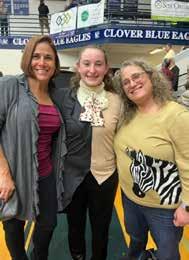
Perhaps it is our wonderful leaders on our board of directors who have given their time and energy to see this congregation thrive (even through a pandemic). Maybe it is all our creative activities and celebrations. Nobody can throw a party like Temple Kol Ami!
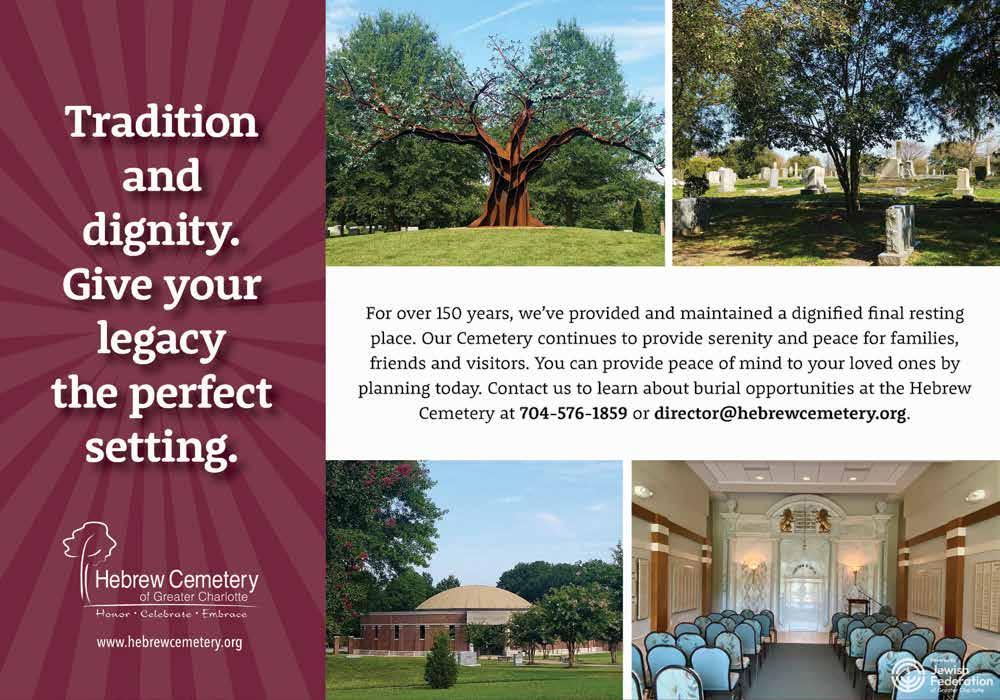
Perhaps it is the lectures that we have presented that have brought meaningful speakers
to our corner of the world. It could be our spiritual leadership. Maybe it is our caring and intentional lay leaders or our guest rabbinical leadership that cares about our families like this was their congregation. I’d like to think it is a little bit of all these things rolled up into one word — community.
Temple Kol Ami supports its members like no other. Our daughters have grown up embracing this congregation as their extended family. Our youngest daughter, Tessa, has known only Temple Kol Ami in her life. The connection of this congregation became extremely evident to us this past month when the Clover Indoor Percussion Ensemble, to which our daughter Tessa belongs, became back-to-back world champions in the World Guard International world championship competition in Dayton, Ohio. They were doing an encore presentation of their award-winning show and in walked members of our congregation. I could not stop smiling! One of our members drove quite a distance on a Wednesday night to our little town of Clover to see a six-minute production. It made me realize why so many
people come up to Jonathan and thank him for acting on his little idea. It hit me that it is those little moments that make Temple Kol Ami special. It is those moments of connection that define our community. Members of Temple Kol Ami have not just become friends, they have become family. If you are looking for a community that values those little moments as much as they value the grander moments, Temple Kol Ami could be the Jewish home for you. Please stop by one of our services or reach out to us. We would love to have you learn why we have become such a special place.
You can reach Temple Kol Ami by connecting with us on our website. www.templekolamisc.org
Temple Kol Ami will be on our summer hiatus from June 5 until August 24. We will then return to our Shabbat services on the 1st and 3rd Friday of the month. Please check our website for any updates.

Religious Life
The Charlotte Jewish News - June/July 2023 - Page 28 Leon Levine 6-08-1937 - 4-05-2023 Ellen Dermack 3-14-1937 - 4-17-2023 Sam Krieger 5-13-1932 - 4-18-2023 Olga Andreyeva 1-16-1939 - 4-23-2023
Always a fan: Shari Baum, star of the show: Tessa Shaw, new fan: Julie Novack,
Hebrew Cemetery
The
joins with the community in remembering the names of those who have been buried at the Hebrew Cemetery in the month of April.
Our House. Your Home.
Splash Into Shabbat! at


the
LJCC POOL - SPLASH PARK
FRIDAY, JUNE 16 & FRIDAY, AUGUST 11, 4:30 PM
During the summer months, all families with children up to 6 years (and their siblings) are welcome to SPLASH INTO SHABBAT at the LJCC Pool/Splash Park! There will be open play, songs, and a Shabbat service, capped off with a delicious kid-friendly meal.
Cost: TI Members - $7/person; non-TI members - $11/person. No charge for children under 1 year of age.
SUMMERTIME FUNTIME
Tuesdays, June 27 and August 1, 4:30-6 pm

Location: Temple Israel
This summer we are continuing with our successful SUMMERTIME FUNTIME events. Rising K-Grade 2 kids: what could be better than a full day of camp or a day of summer fun? More time to hang out with your TIRS and TI friends! Join Rabbi Kornsgold and Alan for fun games, pizza, and dessert at Temple Israel.
Cost: $5 Members; $12 Non-Members
*Open to rising kindergarten through 2nd graders.
*If your child is at Camp Mindy, we will walk them over to Temple Israel for the program


The Charlotte Jewish News - June/July 2023 - Page 29 REGISTER ON THE UPCOMING PROGRAMS PAGE AT TEMPLEISRAELNC.ORG
templeisraelnc.org
The Greater Carolinas Association of Rabbis Wildacres Interfaith Institute
 By Rabbi Edward Friedman
By Rabbi Edward Friedman
It was back in the 1930s that the Blumenthal family of Radiator Specialty Company in Charlotte acquired the mountain retreat that they renamed “Wildacres,” in Little Switzerland, off the Blue Ridge Parkway. I.D Blumenthal paid such a ridiculously low price that he regularly claimed that the mountain was nothing less than a gift from the Almighty. After several ideas had been tried, I.D., his brother Herman, and their wives Madolyn and Anita, realized that such a gift needed an appropriate purpose and ultimately this beautiful place was dedicated to human understanding and has provided a setting for all sorts of religious, cultural, musical, artistic, and scientific groups to gather. Early on, Wildacres hosted a number of religious groups: Jewish, Christian, and interfaith. One group that has been coming year after year since the early ‘50s has been the Greater Carolinas Association of Rabbis (GCAR). Though this group began as a gathering of rabbis from North and South Carolina, it has expanded its reach over the years. Rabbis who moved away to other states often continued to attend the summer Kallah and to invite other colleagues to join them and most came with their wives, children, and other family members. The Kallah has been open to rabbis of all denominations and locations for some seventy years. For six days each summer, rabbis gather to study with a guest scholar, share their own learning, enjoy local entertainment, tour the attractions of the area, and enjoy one another’s company.
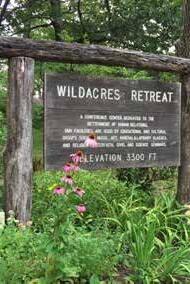

More than 40 years ago, Rabbi Leo Hoffman and his wife, Estelle, decided to create an Interfaith Institute prior to the annual Kallah. They began by asking rabbis to submit names of Christian colleagues who might join them on the mountain for a threeday interfaith gathering. The Hoffmans had been active in interfaith relations in Charlotte and invited their Charlotte friends to come to Wildacres. They sent out invitations to the clergy recommended by the GCAR members. They also had professors of religion from the area colleges in attendance as well. The Hoffmans worked hard to fill up the spaces in the guest lodges, so after they recruited clergy and their spouses, they decided to include interested laypeople also so they would have a full house of over one hundred participants. They invited prominent Jewish and Christian speakers to address the chosen topic of the conference each year. They also made arrangements for a performance one evening of the conference
by musicians from the Charlotte Symphony Orchestra. Lifelong friendships were formed across denominational and religious lines as clergy and lay people sat together for several days in the auditorium, in the dining hall, and on the rocking chairs on the patio, sharing learning, swapping jokes and stories, and getting to know each other and their traditions.
As the millennium drew to a close, the Hoffmans were now in their late 80s and it was time to turn over the leadership of the Institute to younger colleagues. Three rabbis came forward to share the responsibilities: Rabbi Arthur Steinberg from Portsmouth, Virginia, Rabbi Steven Sager, from Durham, North Carolina, and Rabbi Edward Friedman, then serving in Charleston, South Carolina. Though these rabbis gathered during the winter with other participants to plan for the coming year, ultimately Rabbi Sager took the lead in programming the event and sometimes served as the main speaker.
Rabbi Steinberg, at first, served as registrar, but ultimately handed that over to Reverend Michael Watts, a Baptist minister from North Carolina, and took on the arrangements for entertainment as his primary responsibility.
Rabbi Friedman was in charge of setting up the schedule, arranging for prayer leaders, and supervising the koshering of the kitchen each year for the Jewish groups. Sadly, in recent years, both Rabbi Steinberg and Rabbi Sager have passed away and are both very much missed by all. For several years before his death, Rabbi Sager and his wife, Sabina, took on the bulk of the planning for the annual gathering as part of their Sicha Conversation programming. However, as the rabbi’s last illness progressed, the Sagers turned this responsibility back to the GCAR and Rabbi Friedman has continued to shepherd the group and has brought a number of the participants into the planning process.
Marilyn Katz, the synagogue
president and office administrator in Rabbi Friedman’s current congregation in Aurora, Illinois, has taken on the duties of registrar, and the Reverend Dr. Amy Laura Hall from Duke Divinity School has become program coordinator, with other participants stepping up to work on the planning and publicizing of the event. Winter planning meetings in Charlotte with Leo Hoffman and later in Durham with Steve Sager have sadly been replaced by electronic Zoom meetings with participants scattered around the country and the world. It is certainly more convenient to meet that way, but not quite the same as gathering in person in Leo Hoffman’s living room.
About ten years ago, it was decided to invite not only Jews and Christians to the Institute, but to arrange for Muslim speakers as well and to encourage other Muslims to attend. One of the first Muslim speakers was Imam Abdullah Antepli from Duke University. Knowing that a few of the Jewish participants were a bit uncomfortable by the idea of opening the gathering to Muslims, we encouraged Abdullah to bring his family with him and allow folks to experience the Muslim community as real people rather than as some stereotype that they had in their minds. It was wonderful to watch the Antepli children playing with some of the children of the rabbis and Abdullah’s wife, Asuman, socializing with the wives of the rabbis and ministers, giving a face to another culture and tradition. We continue to welcome Muslim families and are very much open to meeting people from other traditions as well.
“My
-Dr.Shirman
As with many activities during the height of COVID, the Institute also was limited to online activities in 2020, and in 2021.. However, last summer, the group reconvened on the mountain and had the wonderful opportunity to study with three outstanding professors from Duke: Jewish, Christian, and Muslim scholars who led discussions on breath and spirit, drawing on their respective traditions to reflect on what it means to be able to breathe once more. A writing workshop that had been introduced several years back by Kathleen Moloney-Tarr, has been continued by Rabbi Robert Wolkoff from North Brunswick, New Jersey. One evening of the retreat was dedicated to hearing some of the moving and creative stories written by participants. On another evening, the group enjoyed a bluegrass musical performance by the Sassafras Band. That lively group has been invited back for this summer as well.
(Continued on page 32)
The Charlotte Jewish News - June/July 2023 - Page 30 Join Our Dental Wellness Club NO DENTAL INSURANCE? NO PROBLEM! No annual maximum No pre-authorization No deductible State-of-the-Art, Technology Advanced & Minimally Invasive Dentistry No waiting periods All Wellness Plans include:
vision is a dental practice built from the ground uponhighmorals,ethics,andvalues.Principlesthat aren’t shaped by insurance companies dictating the course of treatment. Where every detail that goes
the scenes of making that
to
behind
“filling” matter
myclientseveniftheyoftencan’tseeit.”
*Call our Team for more information: 704-317-7337 | dentalwellnessofclt.com Emergency Exam (1/year) Periapical X-Rays (as many as needed per year) 15% off other procedures completed at our practice* Fluoride Treatment (1/year) Panoramic X-Ray (1/5 years) Bitewing X-Rays (4/year) No wondering what insurance will pay towards your treatment Where Wellness Begins ... Experience the Difference! A BOUTIQUE, FAMILY DENTAL OFFICE
Around the Table: Book Review of Michael Twitty’s Award-Winning, “Koshersoul”


cans; it includes converts and native- born Black Jews, and all the fertile ground in between.
Koshersoul Collards
By Charlotte Rouchouze
Michael Twitty’s second book, entitled “Koshersoul: The Faith and Food Journey of an American Jew,” recent recipient of the National Jewish Book Award’s 2022 Jewish Book of the Year, immerses us in the understudied subject of Black Jewishness. This is a topic that speaks to Twitty’s own experience as a Black American Jew and follows up on his first book that explored his African American identity and genealogy.
Twitty’s books are hard to define and defy genre in a way that perhaps reflects their subject matter about complex identity crossings. They are scholarly but personal and, at times, casual in tone; they roam between history, autobiography, critical theory and cookbook, in a style that reminds me of the old literary tradition of publishing lengthy correspondences that ping ponged between the personal and the philosophical. While there are admittedly times when reading Twitty’s books that I wonder where we are headed, or, for that matter, where we are, I have found that if you just buckle in and follow his lead, you will be rewarded. The sheer amount of knowledge about Jewish and African American history that listening in will give you makes it worth the ride.
In “Koshersoul,” Twitty documents conversations with a range of Jews of Color including Marc Steiner, Tony Westbrook, Shais Rishon (who goes by the name MaNishtana on social media) and others. He goes about posing the question of what it means to be a Black American Jew and reflects on the wide range of overlaps between Jewishness and Blackness, as well as the little known history of the cultural interactions between the two. It turns out that Black Jews are not only a product of recent conversion but have their own rich and complex history, and one that we should spend more time listening to. “Koshersoul” includes the hybrid cultures that have resulted from historical interactions between Southern Jews and African Americans both before and after slavery; between Northern Jews and Northern African Ameri -
Twitty does not shy away from the thorniest of issues, bluntly narrating his own experiences of racism among Jews, while exploring the sticky question of Jews’ relationship to whiteness (he astutely names it one of being both inside and outside) as well as antisemitism among Black Americans. His responses to the complex experience of being a Black Jew are resolutely rooted in the cultural richness both of Judaism and of the Black Atlantic. He pulls on Jewish philosophy and prayer (you’ll find a version of the Al Chet prayer of forgiveness reworked to be a reflection on racism and a funny take on tashlich using different southern foods designated for different sins), as well as African American resilience: In so doing, he forges a new koshersoul identity that is seamless and beautiful.
Of course, as the name indicates, cooking and foodways are the thread he follows all along the way. He tells us, “’It smells Jewish in here,’ and ‘Lord have mercy what you got cooking in here?’ are equal in my heart.” He explores cooking as a product and an expression of the vast array of human experiences, from diaspora and geography to enslavement, war, and, of course, hospitality and love. Twitty weaves in discussions of ingredients, attitudes about traditional foods, and creative ways that Jews of Color have defined their own culinary space. No discussion of “Koshersoul” as a concept could be complete without a discussion of Southern Jewish cuisine, and Twitty delves into this with Marcie Ferris Cohen, exploring the interactions between Southern Jews and African Americans in the kitchen, in the community, and in the civil rights movement. For those interested in Southern Jewish cuisine, his reflections on this topic would most definitely be of interest.
I sense that by naming (“Koshersoul”) and reflecting in writing on the Black Jewish American experience, Twitty is consciously defining a space in which these histories and identities can fully exist. He’s writing a history that generally exists in the cracks and overlaps, and shining a light on it. For Twitty it’s not about breaking the narratives of national and ethnic identity, but rather breaking them open, pulling out the hidden strands, and then putting them back together to make a more whole and beautiful story.
Twitty has an insatiable desire to track down, acknowledge and honor every last fragment of the
• ¼ cup canola oil or schmaltz
• 1 cup red onion, cut into thin slices
• 1 long red cayenne pepper, cut into thin rings
• 1 tsp crushed garlic
• 1 tsp crushed ginger
• 1 tbsp pareve kosher “chicken” consommé powder
• 1 tsp kitchen pepper
• 4 lb collards
• 3 cups vegetable stock
• 2 tbsp lime juice
• 2 tsp coconut sugar
• 1 tsp smoked paprika
diverse puzzle of influences that each of us carries in us. Every cross-fertilization that has been long forgotten. He seeks to find each piece, each strand of our cultural past, and remember it. Hold it dear.
Reading this book allows us to take a moment to dwell in that space that Twitty has generously opened for us. Cooking is the way he both honors the past and forges the future. “Whenever I cook these dishes, I acknowledge the men and women who went before me.”
The book concludes with many “Koshersoul” recipes, including things like Caribbean Compote, Yam Kugel, BlackEyed Pea Hummus, Jamaican Jerk Chicken Spaghetti, Louisiana-Style Latkes, Mrs. Cardoza’s Famous Seven-Fruit Haroset from Suriname, and many more.
I will leave you with a passage from the book and a recipe that will give you a taste of Koshersoul for yourself:
“Jewish food is a matter of text expressed on the table. Entering the Jewish foodscape changed my life. Jewish food and Black food crisscross each other throughout history. Both are cuisines where homeland and exile interplay. Ideas and emotions and ingredients; satire, irony, longing, resistance- and you have to eat the food to extract the meaning. The food of both diasporas depends on memory.
One memory is the sweep of the people’s journey, and the other is the little bits and the pieces of individual lives shaped by ancient paths and patterns. The food is an archive. A keeper of secrets.”
Charlotte Rouchouze, PhD is a local French teacher, food blogger, and beaded jewelry designer. Her blog about food traditions from around the world can be found at www.thechildrenstable.com. Contact her at charlotte.rouchouze@yahoo. com
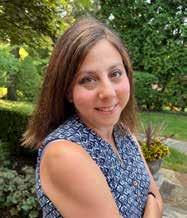
Heat oil or schmaltz in a large pot over medium heat for one minute; after a few minutes, toss in the onion slices, and soon, they will make a telltale light sizzle and begin to sweat. Add the red pepper, garlic, ginger, consommé powder, and Kitchen Pepper and slowly sweat on low heat for 10 minutes, stirring occasionally.
Raise the heat to medium-high. Add the thin strips of collard greens handful by handful, stirring as necessary. With each batch of 3 handfuls, quick cook for about 5 minutes. When all the collards have been incorporated, add the vegetable stock; bring to a boil, and then lower the heat so that the pot settles into a slow bubble. Add lime juice, coconut sugar and smoked paprika.
Viva Klezmer! To Perform at Piccolo Spoleto
As part of the “World of Jewish Culture” component of the Piccolo Spoleto festival in Charleston, SC, Charlotte’s own Viva Klezmer! has been invited to perform a concert entitled "A Klezmer Journey."

Piccolo Spoleto, part of the larger Spoleto Festival, is a world famous arts festival that takes place every spring in Charleston. Viva Klezmer! was formed in 1984 by clarinetist Gene Kavadlo, and has become one of the foremost interpreters of klezmer music in the Southeast. They are proud to have been invited to be part of this festival.
If you will be at the festival or in the area, please plan to attend the concert. It will take place on June 4 at 3 p.m., and will be in the historic Beth Elohim Synagogue on Hassell Street. You’ll love it!
The Charlotte Jewish News - June/July 2023 - Page 31
Wildacres
(Continued from page 30)
We’ve sampled the work of a number of very talented musicians and other artists through the years, often through the kind recommendation of Bill Carson from the Orchard at Altapass.
The Interfaith Institute is now taking registrations for this coming summer. All interested people, clergy, and laity of all religious traditions (or none), are invited to join the group. The Blumenthal Foundation continues to underwrite some of the costs to make this event affordable for all. This year’s Institute will be from July 31 to August 3. The topic is “Hope in Difficult Times: How Can Our Sacred Stories and Faith Traditions Help Us Address the Crises Facing Our World?” Leading the discussion will be Professor Hadia Mubarak, a scholar of Islam from Queens University in Charlotte, Rabbi Tracy Guren Klirs, rabbi and educator from Charlotte, and the Reverend Nancy Hastings
Sehested, a retired prison chaplain and pastor, from Asheville. For registration forms, you may contact Marilyn Katz at MarilynK377@gmail.com.

Registration, including room, all meals, programs, and entertainment, as well as the use of the facilities at Wildacres, is $395 per person, double occupancy if paid prior to June 15. (After June 15, $450 per person). There is an additional $100 single supplement fee. Children are welcome at a reduced price and we plan special programming for them, which will be led by veteran educator Kitty Wolf during the adult discussion sessions.
We cannot conceive of a better way to fulfill the vision of the Blumenthal family to create greater understanding among diverse people than to join in interfaith dialogue and social engagement on this God-given mountaintop off the Blue Ridge Parkway.

The Charlotte Jewish News - June/July 2023 - Page 32 TOURS DAILY | WWW.WALTONWOOD.COM | WWW.SINGHCAREERS.COM C OTSWOLD Assisted Living & Memory Care 5215 Randolph Road Charlotte, NC 28211 704-496-9310 Independent Living, Assisted Living & Memory Care 11945 Providence Road Charlotte, NC 28277 704-246-8670 P ROVIDENCE We cater to seniors who desire social opportunities and a carefree lifestyle. With two great locations and warm, caring staff, you’ll feel right at home as soon as you step inside. • Fresh, fun, and interactive dining experiences with desserts created by our Pastry Chef • Forever Fit wellness programs encouraging resident independence Life Enrichment programs allowing for opportunities of continued learning and special interests • Housekeeping and maintenance teams providing a truly worry-free lifestyle Discover Carefree Senior Living at Waltonwood! Call and schedule a tour today.
Hebrew High: Ignorance Gets Us Nowhere
Student Opinion by Jack Stein
As I scroll through the comments section of an Instagram post from Fulham FC, an English football club, praising their Israeli winger Manor Solomon for scoring in five consecutive matches, I notice a startling amount of comments portraying the flag of Israel next to… a poop emoji?
I begin to search through the posts of other Jews and Israelis that I follow. A harmless post from Deni Avdija, an Israeli NBA player, wishing everyone a “Happy Passover,” is tarnished with revolting words of hate. A clip from Sam Morril, a Jewish-American comedian, shows him getting harassed at a show by a woman yelling “Free Palestine” and that his tour should be shut down. It’s not just famous athletes and comedians either. I’ve personally endured things of the like from peers, both online and at school. Are these messages of hate about a people or a policy?

The line between antisemitism and anti-Zionism has been blurred to a point where it really doesn’t exist anymore. They are conjoined twins; if one goes, the other follows. And unfortunately, as we are all too aware, the rise of anti-Zionism in the past few years as a result of the Israeli-Palestinian conflicts has only brought hordes of antisemitism along with it. We represent approximately 0.2% of the eight billion people on this planet yet are victims of more than half of all religious hate crimes, and the sheer volume of them has increased markedly in recent years as a result of society’s inability to distinguish Judaism from Zionism.
Let me be clear, I’m torn on this issue myself, as there are innumerable layers, some of which date back millennia, to be peeled back. On one hand, Israel has brought a sense of security and belonging to Jews around the world, including myself, and it wholly possesses the right to defend itself against the many threats it faces. The continuous refusal to recognize Israel’s right to exist and continued violence against innocent Israeli citizens has only served to perpetuate a cycle of mutual antipathy.
However, I simply cannot agree with some actions the Israeli government has taken. I can’t deny the existence of oppressive policies directed at Palestinians. I can understand where this Israeli nationalism stems from, although I would think that our troubled history would allow us to understand their perspective better than anyone else. We long yearned for a place in the world as we were persecut-
ed and displaced for thousands of years. Finally, we get a place to call our own — the home of our ancestors — and we want to protect it at all costs. But as Jews, we are all too aware of what happens when pride turns into chest-beating nationalism.
I can understand the people in support of a Palestinian state, as we were in a similar position at one point too. However, when it crosses that line from being pro-Palestine to anti-Israel, it becomes destructive.
This continued lack of understanding between our two cultures is why we must do what no one seems to want to do nowadays: talk. Language has existed for tens of thousands of years, yet conversation somehow seems to be lost on modern humanity. It’s infuriating because people just spout their own opinions and refuse to listen to those of others. They don’t want to be challenged, as it’s much easier for them to stay within their comfort zone, not daring to step too far out. So they surround themselves with people who already share their own beliefs and create an echoic environment for themselves. But only being surrounded by like-minded people reinforces biases, deepens pre-existing divisions, and ultimately limits their understanding of the world around them. We can’t forget that we were victims of one of the worst atrocities in human history as a result of this. A distorted reality was created in Nazi Germany by this confirmation bias and groupthink that ultimately led to the Holocaust and the deaths of millions.
I vividly remember an author coming to my temple and giving advice on how to deal with
the antisemites nowadays, and I was genuinely concerned when he said that we should simply cut them off and block them out because “they don’t want to learn.” Simply ignoring important topics only builds resentment and worsens issues. Engaging in meaningful dialogue with the rest of the world, not just the bigots, is imperative to our well-being, now
and forever. I can promise you, ignorance will get us nowhere.
Jack Stein is a member of the class of 2024 at Ardrey Kell High School, a member of Temple Beth El, and a student at Hebrew High.
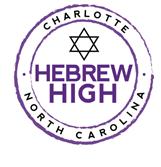
Where Families Come Together
w Featuring 124 beautifully decorated guest rooms and suites conveniently located in Phillips Place


w Complimentary amenities include: Hot breakfast, internet access, transportation to Shalom Park

w Hospitality Suite
w Great Room: Special rates available for Friday night dinner
For more information, contact: Pamela.Haythe@hilton.com
Hampton Inn & Suites SouthPark at Phillips Place, Charlotte, NC 28210 7043195700 www.hamptonsouthpark.com

Carolina Asthma & Allergy Center is the area’s largest asthma and allergy practice made up entirely of board-certified physicians. Our specialists treat patients of all ages for a range of conditions including seasonal and environmental allergies (pollen, animal dander, dust and mold), food allergies, eczema, and asthma. Call our Appointment Line at 704.372.7900

to make an appointment today!
Helping
The Charlotte Jewish News - June/July 2023 - Page 33
SouthPark at Phillips Place
breathe » live » thrive | www.carolinaasthma.com
patients in
Caring for
the greater Charlotte area for more than 70 years.
best lives.
families with allergies live their
Education and Youth
CJDS Completes Reaccreditation With Outstanding Commendations
By Gale Osborne
In April, Charlotte Jewish Day School (CJDS) successfully completed our SAIS (Southeast Association of Independent Schools) reaccreditation with outstanding commendations! Every five years, independent schools of all sizes and flavors undergo an extensive process to ensure the school’s mission, vision, and goals are being fulfilled to their highest potential. The process includes a comprehensive self-study, a review of more than 100 standards for best practices in education, the development of a strategic plan, and surveys and focus groups of parents, faculty, students, alumni, and donors. The 18-month in-depth process culminated in a three-day site visit by select educators from other independent schools, where they conducted more interviews, observed classes, and reviewed our best practices. We found that:

- 92% of parents would recommend CJDS to friends and family.
- 93% of parents believe the leadership team understands what the school needs and is
diligently working to make it happen.
- 95% of parents feel that teachers have their children’s best interests in mind.
- 97% of parents feel their children are happy at CJDS.
- 93% of teachers believe CJDS’s approach to learning is student-centered in both curriculum and programming.
- 90% of students are motivated to learn.
Our strategic plan underscored three areas of strategic commitment:
- Rigorous, Individualized, and Engaging Education as we expand to become a TK-8 school. Our exceptional General Studies and Judaic educators truly understand the ages and stages of our students and will continue to set the bar high for each child. We encourage every student to explore and cultivate their curiosity while continuing to invest in professional development, student differentiation, and student-centered learning through the Design and Innovation Lab.
- Kind, Caring Relationships. Trust, respect, and a consistent commitment to fostering a positive learning community are our
key focuses, while continuing to deepen social-emotional learning skills, creating parent education programs to nurture school-tohome partnerships, and creating opportunities to help parents support their children in taking risks.
- Sustainable Growth to cultivate a culture of philanthropy and ensure leadership succession for generations to come.

We are thrilled to report that CJDS received the highest praise and validation of the core components of our strategic plan with the desire to grow, to provide a Jewish education to as many age groups as possible, to strength-

en the underpinnings necessary to make this all possible and to ensure that school will continue for years to come. This is a wonderful confirmation of what our students, teachers, staff, parents, and alumni live and breathe every day!
The Accreditation Team delivered a report in which CJDS is also commended for:
- Cultivating a rich and meaningful Jewish life for students, faculty, and staff. (CJDS’ commitment to the mission is palpable, and all stakeholder groups noted the outstanding efforts of the school to advance students’
Jewish identity and connection to Judaism, regardless of an individual’s observance levels.)
- Developing a STEAM program that engages students in active learning and serves as an asset to the school community and as a key marketing initiative.
- Fostering a sense of trust with parents. (Parents reported a steadfast belief that CJDS’ faculty have their students’ best interests at heart.)
- Prioritizing quality recruitment practices (salaries, benefits, planning time) to ensure the procurement of faculty and staff that are devoted to the school’s mission and become long-term employees.
- Establishing an academic program that highlights students’ strengths and focuses on critical thinking skills. (Alumni report that CJDS taught them “how to learn” and “how to think.”)
We are truly setting the standard for Jewish education in Charlotte. See how CJDS can work for your family!
UNDER CONSTRUCTION COMING FALL 2023 704.366.4558 | CJDSchool.org CJDS INNOVATION LAB
The Charlotte Jewish News - June/July 2023 - Page 34 Education and Youth
Across
1. Not exactly petite
6. Big happenings
10. Org. filled with millionaires without college degrees
13. Aptly named bug spray
14. Saw, e.g.
15. e-file agcy.
16. HEAL A BOTCH
18. Hard rejections
19. First name on the Supreme Court


20. Haman had a wicked one
22. Complete
24. External: Prefix
26. Kline or Costner
27. SEE HIS RIB
31. On its way, as a letter
32. Generic product’s lack
33. They tend to be extra long on Shabbos
35. LEVY ACHE
38. They produce more losers than winners
41. Nest 45. “Dairy” cookie with no dairy ingredients
46. BEACH LASH
49. “Why?” to Amir
51. Mauna ___ (volcano)
52. “Y” pluralized
53. Blood component
55. Some pickles
58. Not an exact fig. 59. TAAME CHOIR 63. Famous Bruce 64. Soccer guard?
65. Type of tactics 66. Down
67. Makes like a good dog
1. Pluto, e.g.
2. Uninvited Succah guest
3. F.D.A.-banned weight-loss supplement

4. Ocean carnivore
5. She, in Paris
6. Include a PDF

7. Marvel’s Samson or Strange
8. Sounds of awe
9. Office messaging app
10. City that heeded Jonah’s warning
11. Volatile liquid element
12. Gives the OK
17. White bills in Monopoly
21. Rabbi with an eponymous Manhattan school
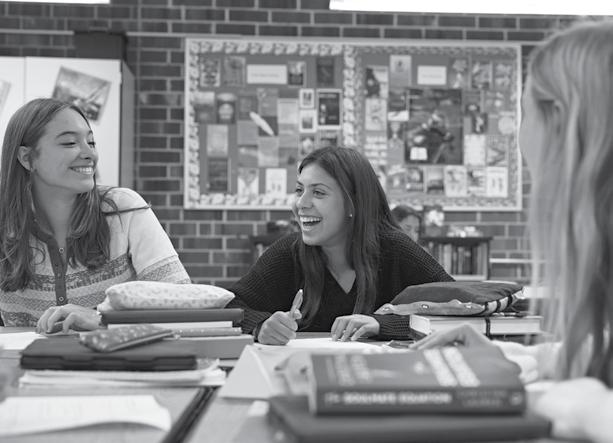

22. Lessen
23. Erev Yom Kippur purchase
25. Place for dough
28. Green, in a way
29. First name in Israeli (and world) music
30. Play the plaintiff
34. Big 12 org.
36. Driver’s lic. datum
37. “...so he named the well ___, because they had contended with him.” (Gen. 26:20)
38. Obligates
39. Kazakh-Uzbek border lake
40. Drugged
42. Champion gymnast
Aly
43. It’s put on a sprain
44. Sounds of hesitation
47. Some Kia’s
48. A nazir’s might be notable
50. Gather
54. “My man”, in Katamon
56. To avoid the risk of

57. Little parasites
60. Smash
61. Gold, in Guadalajara
62. Alaska, once: Abbr.
68. Opera voice Down
The Charlotte Jewish News - June/July 2023 - Page 35 $2 OFF Any Purchase of $10 or more with this ad Mike Sadri Arboretum Shopping Center 7045415099 fax: 7045415989 Only 1 coupon per transaction. Expires 6/30/2023 704-541-5099 Take Out or Delivery with Doordash $2 OFF Any Purchase of $10 or more with this ad Mike Sadri Arboretum Shopping Center fax: (704) 541-5989 June/July Crossword Inquire today at CharlotteLatin.org/admissions 704.846.7207 Reach Higher. Shine Brighter. (Answers on page 38) 1 2 3 4 5 6 7 8 9 10 11 12 13 14 15 16 17 18 19 20 21 22 23 24 25 26 27 28 29 30 31 32 33 34 35 36 37 38 39 40 41 42 43 44 45 46 47 48 49 50 51 52 53 54 55 56 57 58 59 60 61 62 63 64 65 66 67 68
A Teacher Reflects on Her Time at JPS
By Ericka Schilit
“You don’t look so Chabad.” The man sitting across the table from me at the conference I’m attending is trying his best to compute my school affiliation with my pink hair and tattoos. I had offered Chabad as an explanation after having already fielded the question, “Is Sardis a place?” I laugh, understanding the confusion. The truth is, Jewish Preschool on Sardis (JPS) isn’t easy to sum up in a few words.
This is my second year as a lead teacher JPS and when I first started, I felt similarly worried about whether I would fit in at my new school. I worried I was too different. Too different in my teaching style. Too different in my spirituality. Too different in my vibe. I am so grateful, every day that I come to work, that I took the leap.
The past two years, I’ve watched myself grow into a stronger teacher, largely as a result of these differences. I’m learning new things about behavior management, about curriculum, and about Judaism all the time. I’m growing personally and professionally among a group of


fellow teachers from all different backgrounds who all have their own unique “vibe.” What I found was that my vibe has been not only loved but valued.
Those who are a part of the JPS community know that it is just that — a community. Everyone on staff is coming together with their unique skill set to
create the warmest place for our kiddos. I felt this warmth and love firsthand when I got married this past March and my JPS community showed up to bake cupcakes, style my makeup, build decorations, and throw me a post-wedding shower. It takes a village to raise kids or, in my case, to make a wedding. And
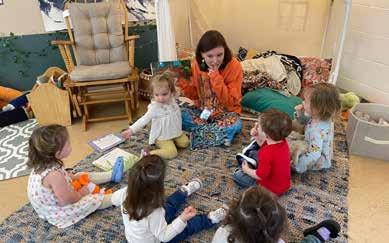
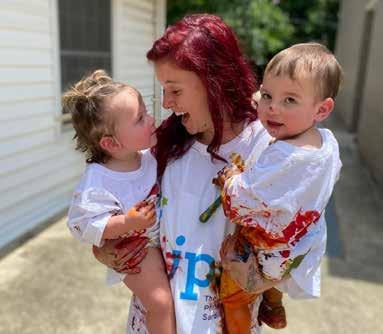
what an incredible village I had.
I often refer to JPS as the “goldilocks” of schools. Not too big and not too small. Big enough to develop your own unique classroom culture, and small enough to feel unequivocally supported by administration. It’s so rare to find a school where as a teacher I’m not having to beg for support from administration. I do not take this for granted.
I’m so excited to continue my professional journey at JPS. I’ve
been longing for a school that I could call “home” and seeing veteran teachers, coming into school every day after 14 years with a smile on their face, I know that this is a place I’ll continue to grow. Thank you JPS, for embracing me, and growing me into a better educator every day.
The Charlotte Jewish News - June/July 2023 - Page 36
The messier we are, the more we’ve learned!
Education and Youth
Circle time with the “matzah balls”.
Volunteer This Summer With the Shalom Park Freedom School
 By Annie Lord and Margaret Musa
By Annie Lord and Margaret Musa
The Shalom Park Freedom School is in session! Forty elementary school-aged children at risk for summer learning loss are attending a six-week literacy and enrichment program at Shalom Park. The program runs from June 20 thru July 27.
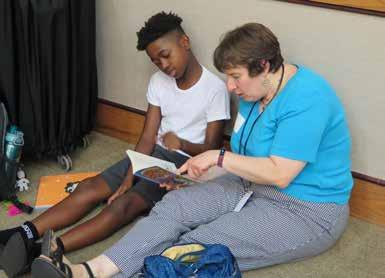
Fulfill the mitzvot of hachnasat orchim (welcoming guests) and tikkun olam (repairing the world) by joining the Shalom Park Freedom School and volunteering with the scholars. Volunteer opportunities include:
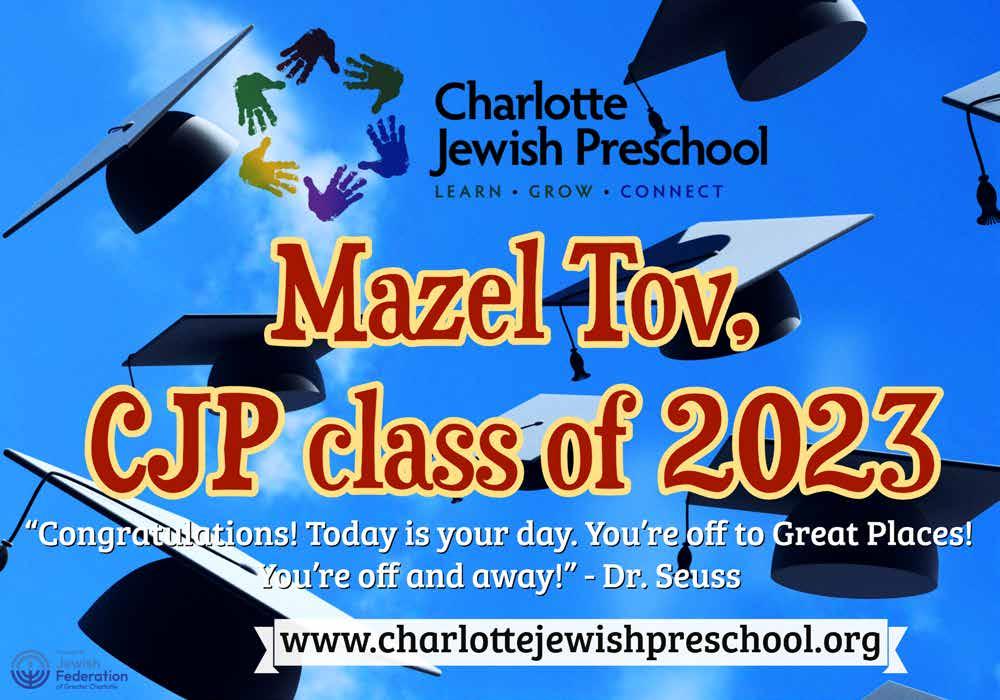
- Reading time, from 11:20 a.m.-11:50 a.m. each day, when volunteers are needed to serve as reading buddies (especially for the first, second, and third grade students).
- Providing food for family nights (June 27 and July 11). It’s as easy as dropping food by the JCC front desk … but, of course, you are welcome to join us for the evening if you are able!
You can sign up to volunteer
on the Shalom Park Freedom School website www.spfreedomschool.org/get-involved/ by clicking on the GET INVOLVED tab, where you will be guided to a Sign-Up Genius page. We look forward to seeing you!

The Charlotte Jewish News - June/July 2023 - Page 37
Education and Youth
Jill Blumenthal reads with Freedom School scholar.



















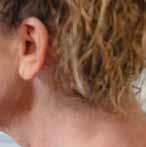




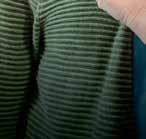



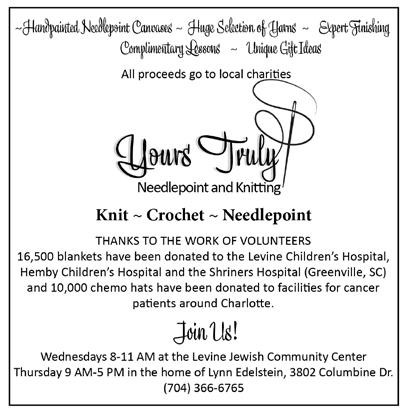

The Charlotte Jewish News - June/July 2023 - Page 38 Live
Less
Briar Creek Health Center
community fosters an environment where residents aren’t just neighbors…they’re friends and they can live more and worry less. Offering: • Assisted Living • Memory Support • Long Term and Short Term Rehabilitation • Skilled Nursing © 2022 The Barclay at SouthPark 6041 PIEDMONT ROW DRIVE SOUTH CHARLOTTE, NC 28210 980.443.6760 | THEBARCLAYATSOUTHPARK.COM A Life Plan Community offered by Liberty Senior Living 122128 barclay at south park bchc live more worry less ad-cjn.indd 1 7/12/22 4:33 PM (Puzzle on page 35) O 1 B 2 E 3 S 4 E 5 A 6 D 7 O 8 S 9 N 10 B 11 A 12 R 13 E P E L T 14 O O L I 15 R S B 16 E H A L O 17 T C H A N 18 O S E 19 L E N A S 20 C H 21 E M E E 22 N 23 D E 24 C T 25 K 26 E V I N B 27 E R E 28 I 29 S H I S 30 S 31 E N T B 32 R A N D L 33 U N 34 C H E S V 35 A Y 36 E 37 L E C H C 38 A 39 S 40 I N O S A 41 E R 42 I 43 E 44 O 45 R E O B 46 E S 47 H 48 A L A C H M 49 A D U A 50 K 51 E A I 52 E S P 53 L A S M A 54 D 55 I L 56 L 57 S E 58 S T A 59 C H 60 A R E I M O 61 T 62 L 63 E E S 64 H I N S 65 C A R E S 66 A D S 67 I T S T 68 E N O R
More, Worry
At
Our
Looking Back: Year 1985
Buildings Named After Benefactors
Blumenthal Jewish Education Building
Both the Blumenthal Foundation and its president, Herman Blumenthal, are well known in philanthropic circles, being responsible for the establishmen and continueance of such outstanding projects as the NC Home for the Jewish Aged, Wildacres Retreat, Circuit Riding

Rabbis, Carolina Association of Jewish Education and numerous grants to institutions and programs in the general community.
The Blumenthal Jewish Education Building will contain all classrooms needed by Temples Beth El and Israel. Hebrew Academy and Jewish Community Center. It will house offices for the Federation, Social Services, Foundation, JCC, “CJN” news room, and provide office and record storage space for the Jewish organizations. An adult lounge, meeting rooms, library, music room and arts and crafts rooms are located around the multi-purpose room which lies in the center of the building. Capable of seating 450 for a lecture or performance, it can be divided into 3 sections for smaller groups. The adjoining kosher kitchen will be able to serve 300 at one time.
Leon and Sandra Levine Jewish Community Center Building
Family Dollar Stores and its founder, Leon Levine, are outstanding examples of American business success. They have both acquired a national reputation for quality of service and for
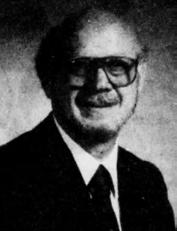
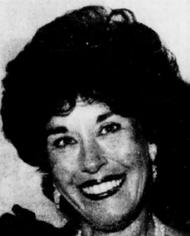
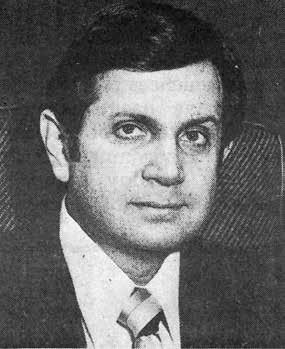
phenomenal growth and development. Despite the demands of such an enterprise, Leon Levine has maintained an active leadership role in both he Charlotte Jewish community and the general community. In this, he has been matched by the activities of his wife, Sandra. Leon’s concerns, involvement and support have been given to Temple Israel, the Federation and the Hebrew Academy. Sandra is past president of Hadassah and involved with Women’s Division of Federation.
The Leon and Sandra Levine Jewish Community Center Building is the half of the facility build around the massive gymnasium. This complex of specialized rooms includes three racquetball courts, a dance/exercise room, full locker facilities, large indoor pool, a youth lounge and game room. An extensive health club, with separate facilities for men and women, includ-
ing saunas and whirlpools and massage rooms and a jointly used Nautilus workout center, is also located there.
Inside, the entire building is circles by a running track. Those hungered by exercise can visit the snack bar which includes an outdoor, screened area overlooking the outdoor pool complex.
LOVE

The Charlotte Jewish News - June/July 2023 - Page 39 Newspaper archives are a treasure trove of collective memories, providing a snapshot of our history. The following article is from The Charlotte Jewish News, September 1985. To read other issues of The CJN, visit the archives at https://www.digitalnc.org/newspapers/charlotte-jewish-news-charlotte-nc/.
A Life Plan Community offered by Liberty Senior Living © 2022 The Barclay at SouthPark DON’T JUST LIVE HERE... LOVE IT HERE. 4801 Barclay Downs Drive, Charlotte, NC 28210 BarclayAtSouthPark.com LIVE at The Barclay at SouthPark and... LOVE the INSPIRE wellness program LOVE the active lifestyle LOVE the only non-entrance fee community in SouthPark LOVE the multiple dining options LOVE the continuing care in place should you need it LOVE the peace of mind for you and your family. Call 980.825.4132 to schedule a tour and see why residents don’t
IT HERE. 122036 barclay love it here people at bar ad-cjn.indd 1 3/3/22 4:32 PM
just live here, they
Herman Blumenthal
Leon Levine
Sandra Levine
Biden Plan To Combat Antisemitism Demands Reforms Across the Executive Branch and Beyond
WASHINGTON (JTA) —
President Joe Biden unveiled a multifaceted and broad strategy to combat antisemitism in the United States that reaches from basketball courts to farming communities, from college campuses to police departments.
“We must say clearly and forcefully that antisemitism and all forms of hate and violence have no place in America,” Biden said in a prerecorded video. “Silence is complicity.”
The 60-page document and its list of more than 100 recommendations stretches across the government, requiring reforms in virtually every sector of the executive branch within a year. It was formulated after consultations with over a thousand experts, and covers a range of tactics, from increased security funding to a range of educational efforts.
The plan has been in the works since December, and the White House has consulted with large Jewish organizations throughout the process. The finished document embraces proposals that large Jewish organizations have long advocated, as well as initiatives that pleasantly surprised Jewish organizational leaders, most of whom praised it upon its release.
Among the proposals that Jewish leaders have called for were recommendations to streamline reporting of hate crimes across local, state and federal law enforcement agencies, which will enable the government to accurately assess the breadth of hate crimes. The proposal also recommends that Congress double the funds available to nonprofits for security measures, from $180 million to $360 million.
One proposal that, if enacted, could be particularly far-reaching — and controversial — is a call for Congress to pass “fundamental reforms” to a provision that shields social media platforms from liability for the content users post on their sites. The plan says social media companies should have a “zero tolerance policy for hate speech on their platforms.”
In addition, the plan calls for action in partnership with a range of government agencies and private entities. It says the government will work with professional sports leagues to educate fans about antisemitism and hold athletes accountable for it, following instances of antisemitic speech by figures such as NBA star Kyrie Irving or NFL player DeSean Jackson.
The government will also partner with rural museums and libraries to educate their visitors about Jewish heritage and antisemitism. And the plan includes actions to be taken by a number of cabinet departments, from the
Department of Veterans Affairs to the USDA.
“It’s really producing a whole-of-government approach that stretches from what you might consider the obvious things like more [security] grants and more resources for the Justice Department and the FBI,” said Nathan Diament, the Washington director of the Orthodox Union. “But it stretches all the way across things that the Department of Labor and the Small Business Administration can do with regard to educating about antisemitism, that the National Endowment of the Humanities and the President’s Council on Sports and Fitness can do with regard to the institutions that they deal with.”
An array of Jewish organizations from the left to the center-right echoed those sentiments in welcoming the plan with enthusiasm, marking a change from recent weeks in which they had been split over how the plan should define antisemitism. Still, a handful of right-wing groups blasted the strategy, saying that its chosen definition of antisemitism diluted the term.
Despite the relatively united front, there are elements of the strategy that may stoke broader controversy: Among a broad array of partner groups named in the plan is the Council on American-Islamic Relations, whose harsh criticism of Israel has led to relations with centrist Jewish organizations that are fraught at best. The call to place limits on social media platforms may also upset free speech advocates.
Biden recalled, as he often does, that he decided to run for president after President Donald Trump equivocated while condemning the neo-Nazis who organized a deadly march in Charlottesville, Virginia, in 2017.
“Repeated episodes of hate — including numerous attacks on Jewish Americans — have since followed Charlottesville, shaking our moral conscience as Americans and challenging the values for which we stand as a Nation,” Biden wrote in an introduction to the report.
The administration launched
Gentleman Doug Emhoff, who is Jewish, convened a roundtable to launch the initiative, the Biden administration has pivoted from focusing on the threat of antisemitism from the far-right to also highlighting its manifestation in other spheres — including amid anti-Israel activism on campuses and the targeting of visibly religious Jews in the northeast. Those factors were evident in the strategy.
include references to the Nexus Document, a definition authored by academics that recognizes IHRA but seeks to complement it by further elucidating how anti-Israel expression may be antisemitic in some instances, and not in others. Others sought to include the Jerusalem Declaration on Antisemitism, which rejects IHRA’s Israel-related examples.
the initiative last December, after years during which Jewish groups and the FBI reported sharp spikes in antisemitic incidents. The strategy was originally planned for release at its Jewish American Heritage Month celebration last week, but was delayed, in part because of last minute internal squabbling over whether it would accept a definition of antisemitism that some on the left said chilled free speech on Israel. Some right-wing groups were deeply critical of the new strategy for not accepting that definition to the exclusion of others.
Rabbi Levi Shemtov, the executive vice president of American Friends of Lubavitch (Chabad) praised the breadth of the plan, and said the delay seemed to produce results.
“The White House has taken this very seriously. The phrase that something is still being worked on can often be a euphemism for a lack of concern,” he said. “In this case, it seems to have resulted in an even more comprehensive and hopefully more effective result.”
Some of the initiatives in the plan focus less on directly confronting antisemitism and more on promoting tolerance of and education about Jews.The Biden Administration will seek to ensure accommodations for Jewish religious observance, the accompanying fact sheet said, and “the Department of Agriculture will work to ensure equal access to all USDA feeding programs for USDA customers with religious dietary needs, including kosher and halal dietary needs.”
Jonathan Greenblatt, the Anti-Defamation League CEO who was closely consulted on the strategy, said promoting inclusion was as critical as fighting antisemitism. “Is FEMA giving kosher provisions after disasters going to solve antisemitism?” he said in an interview. “No, but… it’s an acknowledgement of the plurality of communities and the need to treat Jewish people like you would any other minority community, and I think I’m very pleased to see that.”
In the months since Second
“Some traditionally observant Jews, especially traditional Orthodox Jews, are victimized while walking down the street,” the strategy said in its introduction. “Jewish students and educators are targeted for derision and exclusion on college campuses, often because of their real or perceived views about the State of Israel.”
The proposal that may provoke controversy beyond American Jewry is the Biden Administration’s calls to reform the tech sector, which echo bipartisan recommendations to change Section 230, a provision of U.S. law that grants platforms immunity from being liable for the content users post. Free speech advocates and the companies themselves say that if the government were to police online speech, it would veer into censorship.
“Tech companies have a critical role to play and for that reason the strategy contains 10 separate calls to tech companies to establish a zero tolerance policy for hate speech on their platforms, to ensure that their algorithms do not pass along hate speech and extreme content to users and to listen more closely to Jewish groups to better understand how antisemitism manifests itself on their platforms,” Elizabeth Sherwood-Randall, Biden’s top Homeland Security adviser, said during a 30-minute briefing on the strategy on Thursday. “The president has also called on Congress to remove the special immunity for online platforms and to impose stronger transparency requirements in order to ensure that tech companies are removing content that violates their terms of service.”
In the weeks before the rollout, a debate raged online and behind the scenes amid Jewish organizations and activists about how the plan would define antisemitism. Centrist and rightwing groups pushed for the plan to embrace the International Holocaust Remembrance Alliance’s working definition. Among its examples of anti-Jewish bigotry are those focusing on when Israel criticism is antisemitic, including when “double standards” applied to Israel are antisemitic.
Advocates on the left say those clauses turn legitimate criticism of Israel into hate speech; instead, they pushed to
In the end, the strategy said the U.S. government recognizes the IHRA definition as the “most prominent” and “appreciates the Nexus Document and notes other such efforts.”
A number of the centrist groups pressed for exclusive reference to IHRA, including the Conference of Presidents of Major American Jewish Organizations and the Simon Wiesenthal Center. Those groups praised the strategy and focused only on its embrace of IHRA. So did the Israeli ambassador to Washington, Michael Herzog.
“I would like to congratulate the Biden administration for publishing the first ever national strategy to combat antisemitism,” Herzog wrote on Twitter. “Thank you, @POTUS, for prioritizing the need to confront antisemitism in all its forms. We welcome the re-embracing of @ TheIHRA definition which is the gold standard definition of antisemitism.”
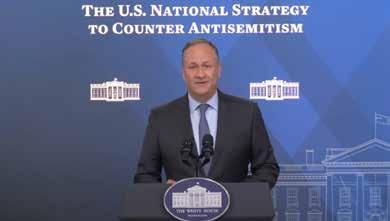
Some center-right groups like B’nai Brith International, StandWithUs and the World Jewish Congress, praised the strategy while expressing regret at the inclusion of Nexus. Right-wing groups, such as the Republican Jewish Coalition and Christians United for Israel condemned the rollout.
RJC said Biden “blew it” by not exclusively using the IHRA definition. The Brandeis Center, which defends pro-Israel groups and students on campus, said the “substance doesn’t measure up.” Groups on the left, however, broadly praised the strategy. “We call on our Jewish communities to seize this historic moment and build on this new strategy to ensure that the fight for Jewish safety is a fight for a better and safer America for all,” said a statement from six left-leaning groups spearheaded by Jews For Racial & Economic Justice.
Greenblatt said it was predictable that groups on the left would take the win and that groups on the right would grumble — but that it was also beside the point. IHRA, he said, was now U.S. policy.
“This document elevates and advances IHRA as the way that U.S. policy will be formulated going forward and across all of the agencies,” Greenblatt said. “That is a win.”
The Charlotte Jewish News - June/July 2023 - BONUS CONTENT
Second Gentleman Douglas Emhoff speaks about the Biden administration's antisemitism strategy at the State Department, May 25, 2023. (Screenshot)
As ‘The Marvelous Mrs Maisel’ Ends, Will Its Jewish Legacy Be More Than a Punchline?
By Shira Li Bartov (JTA)
After five seasons, 20 Emmy awards and plenty of Jewish jokes, “The Marvelous Mrs. Maisel” airs its final episode on Friday.
The lauded Amazon Prime show from Amy Sherman-Palladino has enveloped viewers in a shimmering, candy-colored version of New York during the late 1950s and early 1960s — a world in which “humor” has meant Jewish humor and “culture” has meant Jewish culture.
But as it comes to an end, the show’s Jewish legacy is still up for debate: Did its representation of Jews on mainstream TV make it a pioneer of the 2010s? Or did it do more harm than good in the battle for better representation, by reinforcing decades-old comedic tropes about Jews?
The comedy-drama followed the vivacious Midge Maisel (Rachel Brosnahan) on a journey from prim Upper West Side housewife — left in the lurch after her husband has an affair with his secretary — to ambitious, foul-mouthed comic fighting her way through the male-dominated standup comedy industry. Her New York Jewishness colored her jokes, her accent, her mannerisms and much of her daily life.
That’s because the whole landscape of the show was Jewish, from the well-to-do, acculturated intelligentsia (such as Midge’s parents) to the self-made garment factory owners (such as her in-laws). Even the radical Jewish comic Lenny Bruce, a countercultural icon of the midcentury, appeared as a recurring character who propels Midge’s success.
Henry Bial, a professor specializing in performance theory and Jewish popular culture at the University of Kansas, said the emergence of “The Marvelous Mrs. Maisel” in 2017 exemplified a shift to more overt portrayals of Jews on TV — especially on streaming services. Although Jewish characters featured in TV shows throughout the 20th century, such as “The Goldbergs” in the 1950s, “Rhoda” in the 1970s and “Seinfeld” in the 1990s, their Jewishness was often more coded than explicit. Network television, seeking to attract the majority of Americans coveted by advertisers, feared alienating audiences who couldn’t “relate” to ethnic and racial minorities.
“If there are only three things you can put on television at 8 o’clock on Tuesday night, then there’s a lot more incentive for networks and advertisers to stay close to the herd, because you’re competing for the same eyeballs,” said Bial. “But when people can watch whatever they want whenever they want, then it
opens up for a much wider range of stories.”
Other shows such as “Transparent,” “Broad City” and “Crazy Ex-Girlfriend,” which debuted in 2014 and 2015, are often cited alongside “Mrs. Maisel” as part of a new wave of Jewish representation.
Riv-Ellen Prell, a professor emerita of American studies at the University of Minnesota, argued that Midge subverts the stereotype of the “Jewish American princess.” At the start of the show, she appears to embrace that image: She is financially dependent on her father and husband and obsessive about her appearance, measuring her body every day to ensure that she doesn’t gain weight. Despite living with her husband for years, she always curls her hair, does her makeup and spritzes herself with perfume before he wakes up.
“She looks for all the world like the fantasy of a Jewish American princess,” said Prell. “And yet she is more ambitious than imaginable, she is a brilliant comic who draws on her own life. You have Amy Sherman-Palladino inventing the anti-Jewish princess.”
Bial said that Midge’s relationship with her Jewishness defies another stereotype: That identity is not a source of neurosis or self-loathing, as it often appears to be in the male archetypes of Woody Allen and Larry David, or in Rachel Bloom’s “Crazy Ex-Girlfriend.” Through the spirited banter, the pointed exclamations of “oy,” the titillation over a rabbi coming for Yom Kippur break fast — Midge’s Jewishness is a source of comforting ritual, joy and celebration.
“She has anxieties and issues, but none of them are because she’s Jewish,” said Bial.
Some critics argue the show’s depiction of Jewish culture relies on shallow tropes. In a 2019 review, TV critic Paul Brownfield said “The Marvelous Mrs. Maisel” repurposed stereotypes to appear “retro chic.” He pointed to a consistent contrast between the Weissmans (the assimilated, cultured Jews of the Upper West Side) and the Maisels (the boorish, money-focused Jews of the Garment District), arguing that these superficial types replace an exploration of what the period was actually like for American Jews.
“However ‘Jewish’ Sherman-Palladino wants the show to be, ‘Maisel’ fails to grapple with the realities of the moment in Jewish American history it portrays,” Brownfield wrote. “Which is ultimately what leaves me queasy about its tone — the shtick, the stereotypes, the com-
forting self-parody.”
Meanwhile, Andy Samberg took a jab while co-hosting the 2019 Golden Globes with Sandra Oh. “It’s the show that makes audiences sit up and say, ‘Wait, is this antisemitic?’” he joked.
Others have criticized the show’s casting: Its titular heroine, her parents Abe and Rose Weissman (Tony Shalhoub and Marin Hinkle) and Lenny Bruce (Luke Kirby) are all played by non-Jews. A debate over the casting of non-Jewish actors in Jewish roles has heated up in recent years, taking aim not only at Brosnahan as Midge Maisel, but also at Felicity Jones as Ruth Bader Ginsberg in “On The Basis of Sex,” Helen Mirren as Golda Meir in “Golda” and Gaby Hoffmann and Jay Duplass as the Pfefferman siblings in “Transparent.” Comedian Sarah Silverman popularized the term “Jewface” to critique the trend.
“Watching a gentile actor portraying, like, a Jew-y Jew is just — agh — feels, like, embarrassing and cringey,” Silverman said on her podcast in 2021.
Midge’s rise as a comedian is interlocked with her ally and one-time fling, the fictionalized Lenny Bruce. His character has a softened glow in the show, but in reality, Bruce was branded a “sick comic” for his scathing satire that railed against conservatism, racism and moral hypocrisy. Between 1961 and 1964, he was charged with violating obscenity laws in San Francisco, Los Angeles, Chicago and New York, and he was deported from England. At his Los Angeles trial in 1963, Bruce was accused of using the Yiddish word “shmuck,” taken as an obscenity to mean “penis.” He incorporated the charge into his standup, explaining that the colloquial Jewish meaning of “schmuck” was “fool.”
Driven to pennilessness by relentless prosecution, police harassment and blacklisting from most clubs across the country, he died of a morphine overdose in 1966 at 40 years old. The real Lenny Bruce’s tragedy lends a shadow to the fictional Midge Maisel’s triumphs.
The United States that he struggled with until his death also looks comparatively rosy through the lens of “The Marvelous Mrs. Maisel,” whose protagonist battles misogyny but takes little interest in other societal evils — including still-rampant antisemitism. Some critics have noted that she is oblivious to segregated facilities when she tours with Black singer Shy Baldwin, then nearly outs him as gay during her set.
“‘Mrs. Maisel’ takes place in a supersaturated fantasy 1958 New York, one where antisemitism,

racism, homophobia and even sexism are barely a whisper,” Rokhl Kafrissen wrote in 2018.
Reflecting on the criticism that had piled up by 2020, Sherman-Palladino and her husband Daniel Palladino, also an executive producer and a lead writer for the show, told the Jewish Telegraphic Agency that trying to appease every Jewish viewer was a futile exercise.
“We knew that if we show a Jewish family at temple — if we show them and talk about Yom Kippur and all those kinds of things — there are going to be people who are going to nitpick at specifics that maybe we didn’t get exactly right,” said Palladino, who is not Jewish. “But a lot of the feedback that we’ve gotten has been ‘Thank you. Thank you for leaning into it and showing Jews being Jewish, as opposed to just name checking them as Jewish.’”
Sherman-Palladino added: “[T]here are many different

kinds of Jews! To say, ‘oh, Jewish stereotypes,’ well, what are you talking about? Because we have an educated Jew, we have a woman who was happy to be a mother, we have another woman striking out as a stand up comic, and, you know, Susie Myerson’s [Alex Borstein’s character] a Jew! We’ve got a broad range of Jews in there.”

However “The Marvelous Mrs. Maisel” is assessed in the future, it will remain significant for thrusting a new kind of Jewish heroine into the mainstream consciousness, said Bial.
“Because of its popularity, its longevity and frankly its quality, it’s going to be the example,” Bial said. “In the history of Jews and TV, this is going to be the chapter for the late 2010s and early 2020s — you have to mention ‘Mrs. Maisel.’ It is very clearly a landmark in Jewish representation, particularly for Jewish women.”
The Charlotte Jewish News - June/July 2023 - BONUS
WATCH: Kelly Clarkson- I Dare You Mega-Mix Global Virtual Performance Video
WATCH: Kelly Clarkson: I Dare You, featuring Maya Buskila
On April 16, the inaugural winner of “American Idol” dropped the track “I Dare You” alongside international cuts of the song where she duets with singers from other countries. In the Israeli iteration, בוא נראה, Clarkson duets with Israeli singer Maya Buskila.
Visit jewishcharlotte.org Text "PLEDGE" to 704-327-0354 Call our office at 704-944-6757 3 WAYS TO GIVE Now We Go Forward Now We Go Forward $3,500,000 Our Annual Campaign to date now totals over $3,500,000 from 1140 donors* If you haven’t made your gift to Federation yet – it’s not too late to donate today and make a difference. WWW.JEWISHCHARLOTTE.ORG *as of May 15, 2023.




























 By Debby Block
By Debby Block








 By Mary Eshet
By Mary Eshet



 By Mary Eshet
By Mary Eshet





 By Brian Yesowitch, Hebrew Cemetery Association Historical Chair
By Brian Yesowitch, Hebrew Cemetery Association Historical Chair



































 By Mitch Rifkin
By Mitch Rifkin


























 By Rabbi Chanach Oppenheim
By Rabbi Chanach Oppenheim



 By Dale Rivers, Temple Solel Vice President
By Dale Rivers, Temple Solel Vice President











 By Rabbi Edward Friedman
By Rabbi Edward Friedman




























 By Annie Lord and Margaret Musa
By Annie Lord and Margaret Musa
















































